09 Jan 19 | Events
[vc_row][vc_column][vc_single_image image=”104604″ img_size=”full” alignment=”center”][vc_column_text]Richard Kalinoski’s beautifully written Beast on the Moon, set in 1920s Milwaukee and focusing on Aram and his teenage “mailorder” bride Seta who are united by their shared history as survivors of the Armenian Genocide, has been performed in more than twenty countries. It returns to London in a production commissioned by the Finborough Theatre, where it was last performed in the 1990s.
The Armenian Genocide of 1915-16 was perpetrated by the Ottoman Turkish Government against the Armenians, a Christian minority in a Muslim state. Up to one and a half million people died. To this day, the Turkish government refuses to admit that genocide ever took place. Join Index deputy editor Sally Gimson in conversation with director Jelena Budimir and the cast for a post-show discussion following a performance of Beast on the Moon, which remains a play for our times – a powerful exploration of legacy for so many refugees.[/vc_column_text][vc_column_text]
When: Wednesday 6 February 2018, 7-8:30pm
Where: Finborough Theatre, 118 Finborough Rd, Kensington, London SW10 9ED (Directions)
The discussion is free to ticketholders for that evening’s performance. Tickets to performance: £18 via Finborough Theatre
[/vc_column_text][/vc_column][/vc_row]
09 Jan 19 | Awards, Awards Update, Egypt, Fellowship, Fellowship 2018, Middle East and North Africa, News and features
[vc_row][vc_column][vc_column_text]
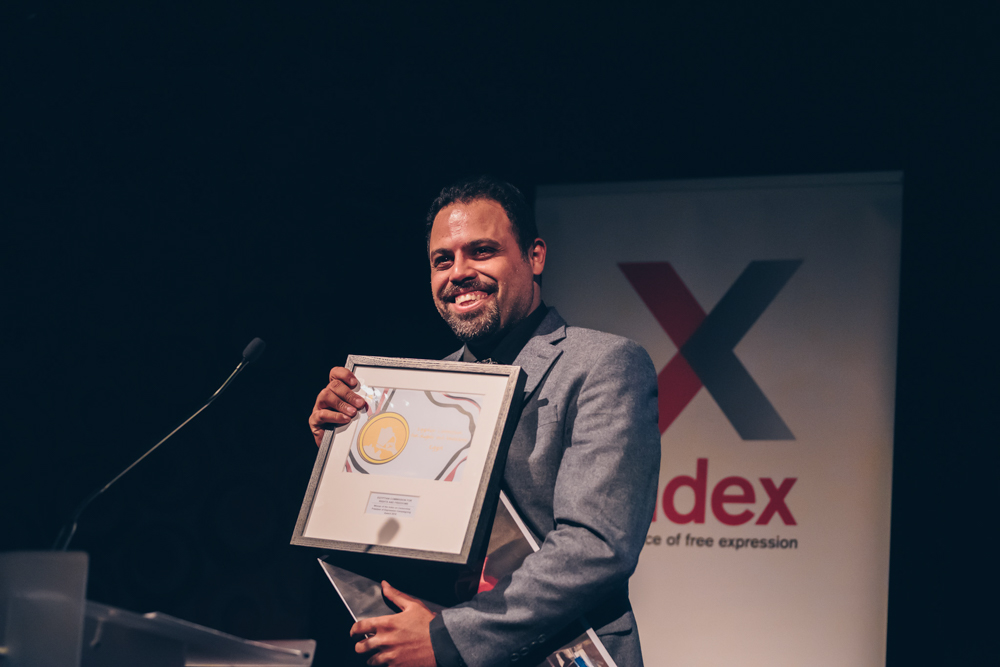
Ahmad Abdallah of Campaigning Award-winning Egyptian Commission for Rights and Freedoms at the 2018 Index on Censorship Freedom of Expression Awards (Photo: Elina Kansikas)
The Egyptian Commission for Rights and Freedoms, winner of the 2018 Index on Censorship Freedom of Expression Award for Campaigning, is one of the few remaining human rights organisations in Egypt, a country that often uses its struggle against terrorism as a justification for its crackdown on human rights. What’s more, in 2018 the group expanded its reach, opening new offices around the country, continuing to highlight human rights abuses and providing support for those facing repression.
In May 2018, Amal Fathy, wife of Mohamed Lotfy, executive director of ECRF, was arrested and charged with “spreading fake news” after posting a video in which she criticised the government and recounted her experiences of sexual harassment on the streets. She was later also charged with “belonging to a terrorist group”, for reasons that have yet to become clear. In late December 2018, Fathy was released, although remains under house arrest. Days later an Egyptian court upheld a two-year prison sentence against the activist, raising fears she could again end up behind bars.
Despite the difficulties it faces, it’s “business as usual” for the group and its work. Index spoke with three ECRF co-founders, Ahmad Abdallah, head of the board of trustees, Lotfy and Mohamed Sameh, international relations advisor to talk about these issues.
How is Amal doing and what has life been like since her release?
Mohamed Lotfy: There are ups and downs at the moment. Of course, she is very happy to be free, finally. However, she is anxious after the two-year verdict issued on the 30 December. We live day by day and we don’t know what might happen.
Ahmad Abdallah: Amal is very tired, she still needs medication. She used to have depression problem and it deteriorated while she was in jail. She has had a horrible experience. With her two year sentence, she can be picked up anytime. She was released on probation and is not allowed to leave the house. She goes to the police station every week. The two-year sentence was harsh and she can be taken any time. She is not well yet, she still needs medical care.
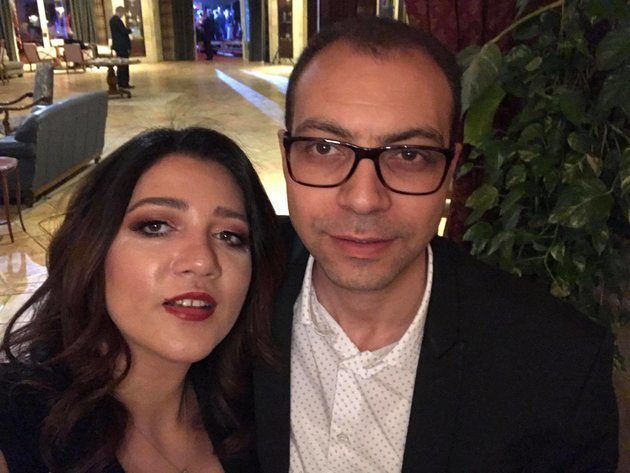
Mohamed Lotfy (right) with his wife, the imprisoned activist Amal Fathy
What does it mean to have Amal home?
Lotfy: It means a lot. It means that our family is reunited. The boy can stay with his mother and father in the same place after spending almost eight months without the two of us. I was visiting my family or her family where he was staying but now, for the first time in eight months, he can see his father and mother every day at home. It’s a big change for him, for her and for me as well. It’s a feeling of home.
Abdallah: It was very good to see them together once again. It was very good for her son to see her. We expected that we could start her treatment but, unfortunately, a couple of days later she took a very harsh sentence. We are all disappointed and sad. Amal is a good person — she shouldn’t be in jail.
Lotfy: I made an official request to the National Council for Human Rights asking for a presidential pardon after the court gave Amal two years prison. The ruling is a very negative message to send to Egyptian women, to say that a victim of sexual harassment could be imprisoned for calling out this plague while harassers remain free. There is a whole social and political dimension to this. If Amal is imprisoned women will be discouraged from taking any legal steps or speaking out against sexual harassment and this is highly problematic. This can be dealt with a presidential pardon.
People continue to be arrested in Egypt, from academics and lawyers to journalists and activists. How do you view the current situation in the country and do you see any signs of hope for improvement?
Lotfy: The image is very bleak. We’ve seen no progress in the last year. We hoped that there would be less crushing of the dissident and fewer arrests against dissidents after the presidential elections. However, these arrests continued and disappearances and torture have continued. The same record on human rights continued throughout 2018. But as long as there are people who are trying to make things better and defending human rights in Egypt, then there is hope.
Abdallah: The situation in the country is disastrous, but I believe in the Egyptians and I believe in the youth. They are the light at the end of the tunnel.
What was it like for Mohamed Sameh to meet with fellow Index award winners the Cuban Museum of Dissidence when he was in London? What struggles and hopes do you think you both share for your home countries?
Mohamed Sameh: It was great to meet with the fellow Index award winners the Museum of Dissidence in London. We share many views and very similar challenges and it was wonderful such a connection across the Atlantic. Building bonds of trust is essential not only for our work, but also showing us in practice that we are not alone in our struggle. It helps putting the challenges we face in perspective. When we heard of their arrest in December, they were no longer only names, but friends who needed our support. We are happy and proud that we stand together.
ECRF recently opened two new offices in Egypt, in Aswan and Mansoura. Why were new offices necessary and how will it allow you to realise the aim of becoming more digital and ensuring the safety of both yourselves and those you work with?
Lotfy: One of the critiques of human rights organisations is that they are very centralised in Cairo and don’t reach out enough to the population outside of the capital. This is very true, so we are trying to deal with this weakness by investing more time and resources and personnel elsewhere in areas that have needs that are a bit different. Cairo being a big city has mainly civil and political rights needs, while other areas have more human rights issues that have to do with health, economic rights, environment, labour rights and so on. We have to be able to care about the main civil and political rights that we find a lot in Cairo and the specific needs of areas in Egypt like Aswan and Mansoura.
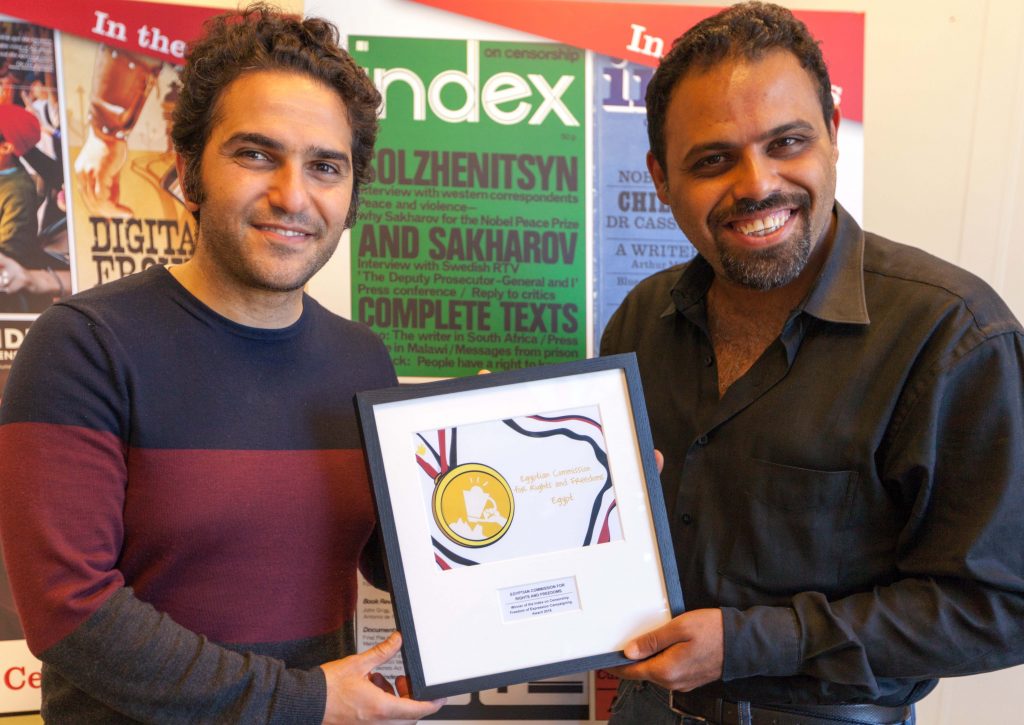
Human rights defenders Mohamed Sameh and Ahmad Abdallah of 2018 Freedom of Expression Campaigning Award-winning Egypt Commission on Rights and Freedoms. (Photo: Index on Censorship)
What does the Index on Censorship Fellowship mean to ECRF?
Lotfy: The fellowship from Index on Censorship has been very useful in opening our channels of communication with technology experts, with capacity building for staff members and senior members of management. But also, in the case of Amal, specifically, I was astonished by the amount of interest that Index has shown to the case of my wife either through publicity, lobbying but also through the complaints made to the UN. These were outputs and help that I did not expect and found very useful and freed my wife as well.
When members of our team travelled to Berlin for training in digital technologies, they exchanged ideas ideas about preparing the ground for the future of our human rights work and for the future generation of human rights activists that is more engaging, technology-oriented, secure and allows for a much bigger outreach of people interested in human rights.
Abdallah: The fellowship has really given us huge opportunities to improve and to progress in our work. It has opened new doors, especially in the use of technology in human rights.
Sameh: The Index award has been of utmost importance to us. It introduced us to a new terrain of co-operation and perspective. The dynamic it has created within our team has been vital for many of the steps we have undertaken since April 2018.
What lays ahead in 2019 for ECRF?
Lotfy: We continue to do our work. Business as usual. Every day we are still around and able to fight for human rights is a victory in the difficult circumstances we work in.[/vc_column_text][/vc_column][/vc_row][vc_row][vc_column][vc_basic_grid post_type=”post” max_items=”4″ element_width=”6″ grid_id=”vc_gid:1547050462858-06f4b172-7d5e-7″ taxonomies=”24136″][/vc_column][/vc_row]
07 Jan 19 | Artistic Freedom, Artists in Exile, News and features, Turkey
[vc_row][vc_column][vc_column_text]
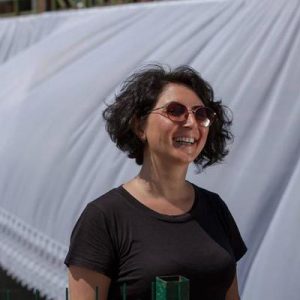
Özgül Arslan
“It turned into a place where it became impossible to breathe,” says feminist visual artist Özgül Arslan about Turkey. “Everything and everywhere changed. Nothing was familiar anymore. Everything that makes up the country’s memory is being sold, demolished and destroyed one by one.”
Arslan grew up in a Turkey marred by the 1980 coup d’etat, when the Turkish military overthrew the government following violence between left- and right-wing factions. Though some say military rule helped stabilise Turkey, which changed prime ministers 11 times in the 1970s alone, the military arrested hundreds of thousands of people and executed dozens more. Others were tortured or just disappeared — all for their activism, opinions or work.
Arslan, and many others living in Turkey, learned how to remain silent for their own safety. It was this period of silence that drew Arslan to art. With its metaphors and hidden messages, it gave Arslan a voice.
But even now, Turkey is growing increasingly illiberal under President Recep Tayyip Erdoğan. Erdogan has taken control of media, diminished the opposition party, and restricted freedom of expression by imprisoning journalists and human rights activists. The president has also restricted the role of the parliament and prime minister, allowing himself to legislate by decree.
Socially, the situation is just as grim. Erdogan has spoken of creating a “pious generation,” one which adopts traditional Islamic values. This trend is seen in education, with religious schools receiving more funding than secular schools, despite having less students. In 2017, secular schools were forced by the government to remove evolution from the curriculum, which was seen as the government’s conservative and religious ideology infiltrating schools. The government defended the changes, saying the new curriculum would be both nationalist and moral.
The government has also condemned feminism, with Erdogan saying in 2014 that women and men were not equal. Arslan said that women are taught to be chaste at every opportunity. Furthermore, Arslan is a part of the Alevi faith, a minority sect of Islam. Arslan says there has always been problems for people of the Alevi faith, but now the Erdogan is pressuring everybody not of the majority Sunni faith.
“It is meaningless to live in a country where the government is constantly uttering threats. It makes our lives, our humanity and our minds lose their worth,” Arslan said.
She didn’t want to raise her daughter in this kind of environment, so she and her husband moved to London in 2016.
Arslan, who has done exhibitions both in Turkey and abroad, spoke to Leah Asmelash from Index on Censorship about censorship of the arts in Turkey, how her beliefs affect her work and upcoming projects. [/vc_column_text][vc_single_image image=”104410″ img_size=”full” add_caption=”yes” alignment=”center” onclick=”custom_link” link=”http://ozgularslan.com/catharsis-circle/”][/vc_column][/vc_row][vc_row][vc_column][vc_column_text]Index: How old were you when you first started creating art? What drew you to it?
Arslan: Since I was born until I was 11-years-old I lived in Erzincan, a city in eastern Turkey located within an earthquake zone. We sometimes used to stay in a tent put up on a land near our house for our safety. There would be no paper nor paints, we only took with us the most basic supplies necessary for living. Whenever we would enter to our house, which we called shelter, or go out of it, we would run. There would always be something of a construct and reconstruct around me when I was growing up. What I made at the time were – I could only define it long afterwards – “land art” experiments. I would draw on earth, rocks, branches, water, snow, ice, crops, etc. anything you could think of. I would give them shape, interfere with their natural cycle, reorganize them, then observe the changes they would undergo and the entire process of it… This was a kind of game I played with nature. I used to do and nature would undo again what I made. I have produced this type of ecologic artworks during my first years at university.
These were times when we were caught between tradition, faith and parents who would keep silent and teach their children to remain silent like them after the 1980 military coup. I always wanted to make art, but what drew me into it was art’s metaphorical and ironic narrative using symbols. It was a path I chose intentionally to record the process of defining myself and what was happening around me.
Index: Your art typically has political messages. When did your art become political? Was it a response to things happening around you?
Arslan: When I was studying at university, I would often hear that it wouldn’t be easy for a woman to make art. There was a lot of gender discrimination in art as everywhere else. The exact same struggle I was giving against my family, society or the state stood right in front of me in the world of art. The mere fact of continuing working with the belief that it is possible to make art anywhere, with anything and under any condition was a political stance in itself.
Domestic violence, child abuse, the insignificance of being a woman, privation, deficiencies in education, discriminations based on identity, etc. Any of these issues related to this region is my past… What is personal is political. As an artist, I chose to express my relationship with the present and my questioning through my work. Even though I can’t really tell if there was a defining moment, there has always been a latent political content in all my artistic works.
In short, I wanted to create a visual language consisting of personal and social codes and references to question the relationship between public space, home and modernity.
Index: Much of your work features different mediums, including painting, photos and videos. Why have you chosen to use such differing mediums?
Arslan: I mainly studied literature, philosophy and art history. I was an avid reader and I also used to draw. I used to paint on canvas during my high school years and afterwards. I worked for a painting gallery and for an architecture firm that would also make decorations. I learned a lot of things there that would have been impossible to learn at school. I also worked with painters, studied painting and acting. Murals I made during my university years in internal spaces and outdoors, the different techniques I have tried while working on walls and through my work with materials such as glass helped me to understand what decorativeness corresponded to technically and in terms of content.
Although the first conceptual works date back to 1965, because those did not have a continuity, we can set the starting date of contemporary art production in Turkey in the end of the 1980s. The military coup of 1980 played a significant role in it. But art was still affected by the negative influences stemming from the domination of Turkish modernism and the tradition of painting attached to it. One of the results of this conservative influence was that art institutions would not give an opportunity to young artists.
As someone who started making art works at the end of the 1990s, the core of my influences from photography to video and from using manufactured articles to painting are the Dada movement in 1920s and the conceptual arts that started developing in the 1960s. By using various medium and developing new techniques, I have adopted a multidisciplinary construct in which the content of the project was determinant.
This also included my choice of spaces. With the Internet becoming a part of our life, I have also sought with my work to define the field and how we would position ourselves in it. When conceiving the form, essence and content of my artistic works, I usually try to work in public spaces other than art galleries and organize the space in a way that has a bond with what I want to produce.
I chose the medium either according to the content and to the space after conducting my research and reading on a certain concept and questions that arise from a given situation or totally based on my intuition. This can either be an object, a manufactured article, a photograph or a video, or I may also develop a new technique different from the traditional ones by using other medium befitting to the content.
Index: You come from an Alevi background, which is considered heresy by the by the dominant form of Islam, and Alevis face a lot of persecution in Turkey. People have said that Erdogan is trying to make Turkey more Sunni. How is freedom of religion diminished in Turkey, and how are you affected by that?
Arslan: In 1993, radical Islamists staged an arson attack on the Madımak Hotel in Sivas where intellectuals who came to attend an event in the city from across Turkey were staying, because they were Alevis and atheists. Thirty-three intellectuals and two hotel workers were killed in the attack. The subsequent trial dropped due to statute of limitations. Today, those who were defending that disaster sit in important positions in the government.
As you say, Alevis have always been under pressure but freedom of belief is no longer a problem unique to Alevis in Turkey. It is the problem of seculars altogether. Conservatives are trying to put everyone else under pressure to be and live like them. When 20 or 30 years ago it was the secular way of life which was imposed on everyone, it’s now conservatives who are exerting the same pressure. Nothing has changed or improved in the life of Alevis, they still feel themselves forced to hide their identity.
Part of society who wants to see modern and rational policies and move forward is facing a group ruling – or wanting to be ruled – with ignorance. It is meaningless to live in a country where the government is constantly uttering threats. It makes our lives, our humanity and our minds lose their worth. Some of our friends have been deprived of their freedoms or their jobs just because they have pronounced words such as “freedom” and “peace.”
Index: Your work commonly features women and comments on sexism within society. Why is that message important to you? How does your identity as an Alevi woman impact your perspective and thus the art you create?
Arslan: There are too many issues concerning women’s rights. There is a predominant patriarchal discourse at home, at work, at school and anywhere you can think of. There are cultural codes embedded in society through state and religion. Those are constantly telling us what we can or we cannot do, how we should obey, how we should love, what we should wear and even what we should eat. We are fighting for our human rights every day, even with our closest ones. I consider myself as a feminist artist. Since I make art through my personal references as a woman, an artist, a teacher and a mother of a girl, women, children and all the marginalized are my problem too.
I see myself lucky for being born in an Alevi family, despite being socially marginalized and subject to a degrading discourse. Alevi families traditionally raise their children with freedom of belief. They respect everyone’s beliefs because of their own faith. Moreover, there is no prohibition of representation and statues like in conservative Islam.
Being raised in an Alevi family allowed me to notice at an early age social discriminations based on identity, state and religious policies, people who were marginalized and marginalization in general and to develop a sensibility on these issues.
Index: As Turkish society grows increasingly conservative, how are artists being silenced?
Arslan: Every dissenting, marginal opinion is being finger-pointed as a target by the government. Artists are being discredited. Either their artistic works are censored or artists themselves exercise self-censorship.
In the past years, galleries in the center of Istanbul were attacked by mobs with batons and stones because people were allegedly drinking alcohol – actions we call “pressure from the neighbourhood.” Those galleries either moved or closed. No one claimed responsibility and no legal action was initiated against anyone over the incidents. There has been attacks targeting certain exhibited pieces in different events. Some artworks were removed. Not only they don’t understand contemporary art, but they are also pointing the fingers at the artistic work on this field through disdainful social media comments or statements relayed pro-government publications. By doing so, they turn these artists into a target for their supporters.
No artistic event whose content doesn’t back the government’s discourse or which is traditionally aligned with it can get funding or financial support. Many theatres were closed, buildings housing art schools and conservatories were emptied. Academics at schools were either dismissed or reassigned somewhere else. A lot of statues in public spaces were removed and no one really knows what happened to them. Others were subject to attacks and damaged by radical Islamists. Works of art were called “monstrosity” by the authorities. A large number of historical artefacts restored by government supporters who had no experience have been irreparably damaged. Buildings with an important historical and artistic significance, such as the Atatürk Cultural Center in Istanbul, were demolished. The parliamentary speaker ordered actresses during a theatre performance to get out of the stage and the play continued without any woman acting. Several restrictions were brought to performing arts under state institutions such as theatre and ballet.
Index: How has this silencing affected the way you work and what you produce?
Arslan: Part of my work has been influenced by social movements. This led me to question art and work on new techniques – which I shared with my students. But in the last few years, the way I presented my work was much stronger as a result of what we have been through. I have tended to render apparent what used to be covered up by using an aesthetic language.
Index: What motivated you to leave Turkey?
Arslan: It turned into a place where it became impossible to breath. Everything and everywhere changed. Nothing was familiar anymore. Everything that makes up the country’s memory is being sold, demolished and destroyed one by one. Nature got its share too. Rivers, streams, lakes, forests, lands owned by the treasury, cultural heritage sites, the air, water, the soil, seeds… So much has been sacked.
Those who speak up against it are arrested in their house in the middle of the night and kept in jail for months without an indictment. They otherwise lose their jobs.
“Either you have to keep silent or you will leave.” Think a President who threatens half of the population with the other half that elected him. We have recently witnessed a number of bomb attacks, we were subject to tear gas almost every day and we became used to walk between water cannons and armed riot police.
They took children from their schools to events held by a pro-government foundation or the directorate of religious affairs without asking the permission of their families.
Turkey has turned its back to science. Entire curriculums were changed. Many qualified teachers were dismissed. The country is rapidly verging to Dark ages in the hands of a government looking to raise a “religious and rancorous” generation.
The number of sexual attacks and violence against children and women is very high. While the “man” who perpetrates this crime can get a reduction of sentence for good behaviour in court, the fact that a woman wore a mini skirt or went outside late at night can be used as a justification for “provoking” him. If the laws don’t protect women and children, they also give women lectures of chastity at each opportunity. The government is aggressively discrediting the discourse of feminists. What we call “the pressure from the neighbourhood” is now a reality everywhere.
As a feminist family, we didn’t want to raise our daughter with a conservative education which is not based on science. Personally speaking, I preferred to move where I could work more freely and keep developing my art without exercising self-censorship rather than sitting back and watching everything.
There are a lot of modern families who left Turkey and stopped their careers to move in other countries. These are families who don’t want to force their children to live under this dark regime. Especially secular white collars are leaving Turkey.
As writer Tezer Özlü once said, “This not our country, but the country of those who want to kill us.”
Index: Now that you’re based in London, how do you think this change in location will affect your art, if at all?
Arslan: My art studio is in Turkey. Most of the artwork I have produced and my materials are also there. My conditions of work are changing and my production is limited. I am trying to live and continue producing with my meagre means. I also follow the artistic production here and learn about the processes of production.
After moving here, I opened one solo exhibition in Istanbul and took part in group exhibitions. Being invited in group exhibitions here as well is a great satisfaction and keeps me motivated to produce more works. Artists and curators I have worked with in London are very understanding and open to communication and sharing.
Although I am far from Turkey in terms of distance I still follow what happens day. I continue thinking and reading about being subject to everyday violence. Although I define myself as a “voluntary migrant”, I started to focus on the links between voluntary migration and violence and oppression. The artworks I am producing here follow this direction.
Index: How is your art, with its feminist messages, received in Turkey versus internationally? Is there a difference and if so, why do you think that is?
Arslan: The audience in London knows a lot about art. They can therefore read your work very easily. I needed to make less explanations to the public in London than what I used to do in Turkey. Generally speaking, the audience here has extensive knowledge about art, they are interested in feminism or other political issues and better equipped to empathize. My methods of productions are methods or metaphors they are familiar with. The themes of my artworks are not only issues we are confronted in Turkey but current universal issues we are facing.
[/vc_column_text][vc_single_image image=”104411″ img_size=”full” add_caption=”yes” alignment=”center” onclick=”custom_link” link=”http://ozgularslan.com/exposure-maruz/”][/vc_column][/vc_row][vc_row][vc_column][vc_column_text]Index: Sanat yapmaya başladığınızda kaç yaşındaydınız? Sizi sanat yapmaya çeken neydi?
Arslan: Doğduktan sonra onbir yaşına kadar ki sürecim Türkiye’nin doğusunda bulunan şehirlerden biri olan ve deprem bölgesinde yer alan Erzincan’da geçti. O yüzden güvenlik nedeniyle bazı dönemlerde haftalarca evimizin yakınındaki arazide, sadece çadırda kalmamız gerekirdi. Kağıt, boya malzemeleri yoktu, sadece yaşamsal zorunluluğu olan malzemleri yanımıza alırdık. O zamanlarda ev, sığınak dediğimiz yere ise koşarak girip koşarak çıkardık. Etrafımda hep bir “yapı kurumu”(construct) ve “yeniden yapım”(reconstruct) vardı. O zaman ürettiklerim daha çok sonradan tanımını koyabildiğim “Land art” denemeleriydi. Toprak, taş, dal, su, karlı arazi, buzlar, ekinler vs. aklınıza ne gelirse üzerine çizmek, şekil vermek, onların var olan döngüsüne müdahale etmek, düzenlemeler yapmak ve sonrasında geçirdikleri değişimi, süreci gözlemlemek… Bu bir çeşit doğayla oyun oynamaktı, ben yapardım o da tekrar değiştirirdi. Üniversitenin ilk yıllarında bu tip ekolojik çalışmalar ürettim.
Gelenek, inanç ve 1980 darbesi nedeniyle susulan, çocuklarına kendileri gibi sessiz kalmayı öğreten veliler arasında geçen dönemlerdi. Sanat yapma isteğim hep vardı ancak en çok da sanatın kodlarla, metaforik ve ironik anlatım yönü beni sanata itti. Kendimi ve çevremde olup bitenleri tanımlama sürecimi kayıt altına almak için bilinçli olarak tercih ettiğim bir yoldu.
Index: Eserlerinizde genellikle siyasi mesajlar görmek mümkün. Sanatınız ne zaman politik hale geldi? Etrafınızda olup bitenlere karşı bir cevap mıydı bu?
Arslan: Üniversite yıllarımda bir kadının sanat yapmasının pek de kolay olmayacağının altı sık sık çiziliyordu. Kadın ayrımı her yerde olduğu gibi sanatta da vardı. Aile, toplum ve devletle verdiğim kimlik mücadelesi sanat ortamında da karşımdaydı.Her yerde, her şeyle ve her şartta sanat yapılır anlayışıyla çalışmalarımı devam ettirmem de politik bir tavırdı.
Aile içi şiddet, çocuk olarak uğradığınız tacizler, kadın olarak hiç bir değerinizin olmaması, yokluk, eğitimdeki eksiklikler, kimlik ayrımları vs. Bu coğrafyanın sorunu olan her şey benim de geçmişim…Kişisel olan politiktir. Ben de bir sanatçı olarak var olan durumla ilişkimi, sorgulamalarımı, çalışmalarımla ifade etme yöntemini seçtim.
Kesin zaman verememekle birlikte sanırım çalışmalarımda gizli politik bir içerik hep vardı.
Özetle, kamusal alan-ev-modernite ilişkisini ve politikalarını sorgulayan, kişisel ve toplumsal kodlara referanslarla bir görsel dil oluşturmak istedim.
Index: Çalışmalarınızın önemli bir kısmında resim, fotoğraf ve video gibi farklı sanatsal araçlar başvurmanız dikkat çekiyor. Neden birbirinden farklı medyumlar kullanmayı tercih ettiniz?
Arslan: Ağırlıklı olarak edebiyat, felsefe, sanat tarihi dersleri aldım. İyi bir okuyucuydum ve resim yapardım. Lise yıllarımda ve sonrasında tuval yapım ve yerel resim galerisinde, daha sonra da dekorasyon yapan bir mimarlık şirketinde çalıştım. Okulda öğrenmenin olanaksız olduğu çok şey öğrendim. Aynı zamanda ressamlarla da çalıştım ve akademik desen, resim ve oyunculuk eğitimi aldım. Üniversite yıllarımda, dış ya da iç mekanlara yaptığım duvar resmi, denediğim duvar üzeri farklı teknikler ve cam gibi malzemelerle yaptığım işler sayesinde dekoratif olanın, hem içerik hem de teknik olarak neye karşılık geldiğini kavradım.
Türkiye’de güncel sanat üretiminin 1965 yılında ilk kavramsal çalışmalar yapılmış olsa da süreklilik gösteremediği için 1980’lerin sonlarında başladığını öne sürebiliriz ve bunda 1980 darbesinin büyük rolü var. Bu dönemde Türk modernizmi ve ona bağlı pentür geleneğinin sanat alanındaki hakimiyetinin olumsuz etkileri devam etmekteydi. Bu muhafazakar etkilerden biri sanat kurumlarının genç sanatçılara yer vermemesiydi.
1990’ların sonunda üretimine başlamış biri olarak, 1920’lerde Dada ve 1960’lardan itibaren gelişen kavramsal sanat, fotoğraftan videoya, hazır nesneden resme uzayıp giden eğilimlerimin kökenini oluşturuyor. Çok sayıda medyumu bir arada kullanarak ve yeni teknikler geliştirerek projenin içeriğinin belirleyici olacağı çok disiplinli bir yapıyı benimsedim.
Buna mekan seçimlerim de dahil oldu. İnternetin hayatımıza girmesiyle birlikte alanı nasıl tanımlayacağımıza, içerisinde nasıl konumlanacağımıza dair yaptığım çalışmalarım da oldu. Sanat galerileri dışında kamusal alanlarda çalışmaya ve çalışmalarımda biçim-öz-içerik oluştururken mekanın üretilecek işle bağını kuracak şekilde kurgularım.
Sezgisel olarak yada bir durumun sonucunda oluşan bir kavram ve sorular hakkında okuma ve araştırmalarımı yaptıktan sonra, kullanılacak medyumu içeriğe ve mekana göre belirlerim. Bu bir obje, hazır nesne, fotoğraf-video olabiliyor ya da geleneksel tekniklerin ve medyumların dışında içeriğe uygun bir teknik geliştiririm. Kişisel sergilerimde dahi sergide yer alacak her bir çalışmayı mekanda yerleştirilecek düzenlemenin bir elemanı gibi kurgular ve üretirim. Dışarıdan içeriye, içeriden dışarıya bir referans, hemen hemen tüm çalışmalarımda vardır.
Index: Alevi bir aileden geliyorsunuz. Alevilik, İslam’da heretik olarak görülüyor ve Türkiye’de de Alevilere yönelik yoğun baskılar var. Erdoğan’ın Türkiye’yi Sünnileştirmeye çalıştığı belirtiliyor. Türkiye’de din ve inanç özgürlüğü ne kadar daraldı ve siz bundan ne şekilde etkileniyorsunuz?
Arslan: Muhafazakarlar, Sivas’ta Madımak Oteli’nde 1993 yılında bir etkinlik için toplanan Türkiye’nin farklı yerlerinden gelen aydınları, Alevi ve Ateist oldukları gerekçesiyle yaktılar. 33 Aydın ve 2 otel görevlisini hayatını kaybetti. Dava zaman aşımına uğradı. Şimdi o felaketin savunucuları şu anda yönetimde söz sahibi makamlardalar.
Belirtiğiniz gibi Alevilere karşı bir baskı hep var ancak günümüz Türkiye’sinde inanç özgürlüğü sorunu sadece artık Alevilerin sorunu olmaktan çıktı. Bu artık tüm sekülerlerin sorunu. Muhafazakarlar kendilerinden olmayan kerkesi, kendileri gibi olmaları ve yaşamaları için her alanda baskı altına almaya çalışıyorlar. Bundan 20-30 yıl önce seküler yaşam tarzi herkese dayatılırken şimdi muhafazakar kesim bu baskıyı yapıyor. Alevilerin hayatında gelişen veya değişen bir şey yok, hala kimliklerini gizlemek zorunda kalabiliyorlar.
Çağdaş akılcı yöntemleri görmek ve ilerlemek isteyen bir kesimin karşısında cahilce kararlarla yöneten ve yönetilmek isteyen bir kesim var. Sürekli size tehtitler savuran bir yönetimin içinde yaşamak anlamsız. Hayatımızı, insanlığımızı, aklımızı değersizleştiriyor. “Özgürlük”, “barış“ gibi kelimeleri sırf telaffuz ettiler diye koca bir toplumun önünde bazılarımız özgürlüklerinden ya da işlerinden edildiler.
Index: Çalışmalarınızda yaygın olarak kadınlara ve toplum içindeki cinsiyet ayrımcılığına yer veriyorsunuz. Bu mesaj sizin için neden önemli? Alevi bir kadın olmak bakış açınızı ve sanatınızı nasıl etkiliyor?
Arslan: Kadınların hakları konusunda çok fazla sorun var. Evde, işte, okulda aklınıza gelebilecek tüm alanlarda ataerkil söylem hakim. Bize sürekli nerede ne yapacağımızı ve ne yapamayacağımızı, nasıl itaat etmemiz, nasıl sevmemiz, nerede ne giymemiz, ne yememize kadar söyleyen devlet ve din yoluyla toplumda yer etmiş kültürel kodlar var. Her günümüz, insani haklarımız için en yakınlarımızla dahi mücadele etmekle geçmekte. Ben feminist bir sanatçıyım, kişisel referaslarımla ürettiğim için bir kadın, sanatçı, öğretmen ve bir kız çocuğu annesi olarak doğal olarak kadınlar, çocuklar ve tüm ötekileştirilenler benim de meselem.
Türkiye’ de sosyal olarak ötekileştirmeler, hakaret niteliği taşıyan söylemlere maruz kalmış olsam da Alevi bir ailede dünyaya gelmiş olmam konusunda kendimi şanslı görüyorum. Alevi aileler çocuklarını inanç özgürlüğüyle yetiştirirler ve inançları gereği herkesin inancına saygı duyarlar. Ayrıca muhfazakar İslamdaki gibi suret ve heykel yasağı yoktur.
Alevi bir ailede büyümüş olmam topkumdaki kimlik ayrımcılıklarının, devlet ve din politikalarını, öteki olmak, ötekileştirmeleri erken yaşta fark etmemde ve bu konuda duyarlılık geliştirmemde faydası oldu.
Index: Türkiye’de toplum giderek muhafazakârlaştıkça, sanatçılar nasıl susturuluyor?
Arslan: İktidar tarafından muhalilif, marjinal her düşünce hedef gösterliyor. Sanatçılar ve üretimleri itibarsızlaştırılıyor. Üretilen çalışmalar ya sansürleniyor ya da sanatçılar otosansür uyguluyor.
Galeriler, geçtiğimiz yıllarda İstanbul’un merkezinde mahalle baskısı uygulanarak içki içiliyor gerekçesiyle bir grup tarafından taşlı sopalı saldırıya uğradılar. Galeriler oradan ya taşındı ya da kapattılar. Hiç kimse bu olayda sorumluluk almadı ve kimseye hukuki bir işlem yapılmadı. Bazı sergilenen çalışmalara, farklı etkinliklerde saldırılar oldu ya da eserler kaldırıldı. Çağdaş sanat çalışmalarını anlamadıkları gibi bu alanda yapılan çalışmaları küçümseyecek yazılarla sosyal medya ya da iktidara ait yayınlarda açıklamalar yaparak kendi yandaşlarına açık açık hedef göstermekteler.
Geleneksel veya içeriksel olarak kendi söylemlerini desteklemeyen hiç bir sanat etkinliğine fon-maddi destek ayrılmıyor. Tiyatroların çoğu kapatıldı, sanat, koservatuar okullarının binaları boşaltılıyor. Okullarda akademisyenler ya görevlerinde alındı ya da görev yeri değiştirildi. Kamusal alandaki pek çok heykel kaldırıldı, akıbetlerinin ne olduğu belli değil. Yine kamusal alandaki heykellere muhafazakar kesim tarafından saldırıldı, zarar verildi. Sanat eserleri iktidar tarafından “Ucube” olarak nitelendirildi. Bu iktidar dönemi sırasında işi bilmez iktidar yanlılarına yaptırılan pek çok tarihi eser, restorasyon sırasında geri dönüşü olanaksız zararlara uğradı. Tarihi ve sanatta önemli bir yere sahip bazı binalar yıkıldı, “Atatürk Kültür merkezi” bunlardan biri. Meclis başkanı bir tiyatro gösterisinde kadın oyuncuları sahneden indirdi, kadınlar olmadan gösterim yapıldı. Devlete bağlı tiyatro, bale gibi gösteri sanatlarına pek çok gösterim sınırlamaları getirildi…
Index: Bu susturma çabaları çalışmanızı ve sanatsal üretimlerinizi nasıl etkiledi?
Arslan: Sosyal hareketlerden etkilenerek ürettiğim çalışmalarımında aynı zamanda sanatın sorgusunu yaparak yeni yöntemler üzerinde çalışıyor ve eğitimci yanımla da öğrencilerimle paylaşıyordum. Son yıllarda yaşadıklarımızın etkisiyle çalışmalarımdaki sunumlar da sertleşti. Örtbas edileni estetik dille görünür kılmaya yöneldim.
Index: Türkiye’den neden ayrılmaya karar verdiniz?
Arslan: Nefessiz kaldığınız bir yer oldu artık. Her şey her yer değişti. Hiç bir yer tanıdık değildi. Ülkenin belleği tek tek satılıp,yıkılıp yok ediliyor. Doğa da nasibini aldı, nehirler, dereler, göller, ormanlar, hazine arazileri, kültür miras alanları, hava,su, toprak, tohum…pek çoğu talan edildi.
Buna karşı ses çıkaranlar gecenin bir vakti evlerinden alınıyor ve aylarca bir iddianame hazırlanmadan içerde tutuluyor veya işinden edilebiliyor.
Ya susup boyun eğeceksin ya da gideceksin” Bir başkan düşünün ki kendisini seçen %50 ile diğer %50’ yi tehtit ediyor. Son zamanlarımızda sürekli bir yerlerde bombalar patlıyor, neredeyse her gün biber gazına maruz kalıyorduk, tomaların, çelik zırhlı polislerin arasında yürüyorduk.
Çocuklar ailelerinin izni alınmaksızın ders saatlerinde okuldan alınarak İktidar yanlısı bir vakfın ya da diyanetin düzenlediği toplantılara götürülebiliyor.
Türkiye bilime sırtını döndü, tüm müfredatlar değiştirildi. Nitelikli pek çok eğitimci görevinden edildi. “Dindar ve kindar” bir nesil yetiştirmek isteyen bir iktidarın elinde hızla orta çağ karanlığına doğru gitmekte.
Çocuklar ve kadınlara çok fazla cinsel saldırı ve şiddet söz konusu. Bu suçu işleyen “erkek” mahkemede kıravat taktığı için iyi hal indirimi alabiliyorken, kadın ya da çocuk kısa etek giydiği, gece dışarıda olduğu için gibi oldukça anlamsız gerekçeler de ağır tahrik sebebi olabiliyor. Yasalar kadınları ve çocukları korumazken, her fırsatta kadınlara iffetli olma dersleri veriliyor. Hükümet Feministleri hedef gösterici tavırla itibarsızlaştırarak söylemlerinin altını boşaltıyor.
Mahalle baskısı sessiz bir şekilde her yerde.
Biz feminist bir aile olarak kızımızın bilimden uzak, muhafazakar bir eğitimle yetişmesini istemedik. Ben de çalışmalarımı daha özgürce devam edebileceğimi, kendime otosansür uygulamayacağım, sanatımı geliştirebileceğimi düşündüğüm için ve tüm olup bitene seyirci kalmak, hiç bir şey yapamayarak orada olmaktansa taşınmayı tercih ettim.
Bizim gibi Türkiye’den ayrılıp, kariyerlerini bırakıp başka ülkelere taşınan çok fazla çağdaş düşünen aile var. Çocuklarını bu karanlık düzene mahkum etmek istemeyen aileler. Seküler kesimin özellikle beyaz yakalıları ülkeyi terk etmekte.
Yazar Tezer Özlü’nün dediği gibi “Burası bizim değil, bizi öldürmek isteyenlerin ülkesi”
Index: Artık Londra’da yaşıyorsunuz. Bu mekân değişikliğinin sanatınızı etkileyecek mi ya da etkilerse, sizce nasıl etkileyecek?
Arslan: Atölyem Türkiye’de, çalışmalarımın ve atölye malzemelerim de çoğu orada. Üretimimde var olan şartlar değişiyor, produksiyonum sınırlı, kısıtlı imkanlarımla üretmeye ve yaşamaya çalışıyorum. Burada üretilenleri takip ediyorum, üretim süreçleri ve işleyişlerini öğreniyorum.
Buraya geldikten sonra İstanbul’da bir solo sergi ve grup sergilerine katıldım. Burada da grup sergilerine davet almış olmam sevindirici, üretmem için iyi bir motivasyon sağlıyor. Londra’da çalıştığım sanatçılar, ve küratörler oldukça anlayışlı, iletişime ve paylaşıma açıklar.
Türkiye’den lokasyon olarak uzakta olsamda hala oraya ait meseleleri takip ediyorum. Her gün Şiddete (“Everyday Violence”) maruz kalmamız üzerine düşünüyorum ve okumalar yapıyorum. Her ne kadar ben “ gönüllü göçmen” statüsünde tanımlansam da zorunlu ve ya gönüllü göçün şiddet ve zulumle bağını odağıma aldım. Burada ürettiğim çalışmalarım bu doğrultuda ilerlemekte.
Index: Sanatınız ve verdiğiniz feminist mesajlar Türkiye’de nasıl karşılanıyor? İki ülke arasında bir fark görüyor musunuz ve, varsa eğer, neden kaynaklandığını düşünüyorsunuz?
Arslan: Burada ki sanat izleyicisi oldukça donanımlı haliyle çok rahat okuma yapıyorlar. Turkiye’de yaptığımdan daha az açıklama yapmam yeterli oldu diyebilirim. Genel olarak sanat izleyicisini bilgi yelpazesi geniş, feminist ya da diğer politik meselelerle ilgili bilgi sahibiler o yüzden empati kurabiliyorlar. Üretim metedodlarım aşina oldukları yötemler ve metaforlar. Çalışmalarım salt Türkiye’de karşımıza çıkan meseleler de değil, güncel ve uluslararası arenada da örneklerini gördüğümüz konular.[/vc_column_text][vc_single_image image=”104413″ img_size=”full” add_caption=”yes” alignment=”center” onclick=”custom_link” link=”http://ozgularslan.com/silencia-silence/”][/vc_column][/vc_row][vc_row][vc_column][vc_basic_grid post_type=”post” max_items=”4″ element_width=”6″ grid_id=”vc_gid:1546851612980-bd13bbff-a326-1″ taxonomies=”15469″][/vc_column][/vc_row]
04 Jan 19 | Magazine, News and features, Volume 47.04 Winter 2018 Extras
[vc_row][vc_column][vc_column_text]
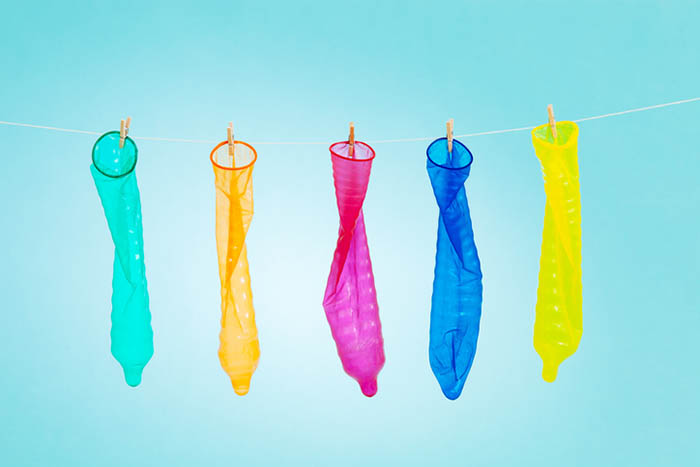
Credit: iStock / LemonTreeImages
Sex and pregnancy continue to be taboo subjects around the world as a special report in Index on Censorship magazine shows. From using toothpaste as emergency contraception to not receiving proper treatment during childbirth, fictional beliefs around sex education and reproductive health, combined with a lack of resources, are leading to sexually transmitted diseases, unwanted pregnancies and problems or death during pregnancy.
Toothpaste isn’t just for cleaning teeth, it can also prevent pregnancy
In Ecuador’s Amazonian region, health workers have reported instances of women using toothpaste after sex to prevent pregnancy. A woman in Mexico, who believed contraception was immoral, thought she’d successfully avoided pregnancies when she had green vaginal discharge — a sign of infection. Latin America and the Caribbean are the only regions in the world where pregnancies are rising among girls ages 15 and under due to ineffective use of contraception and lack of education.
Just touching a man’s hand can lead to pregnancy
In North Korea, a country where information is restricted by the government, topics such sex and reproduction are off-limits in schools, and myths such as touching a man’s hand can lead to pregnancy so prevalent, that STIs and unwanted pregnancies are major problems. Condoms and other forms of contraception are unknown, even among adults. Because the signs of pregnancy aren’t talked about, many women won’t know they’re pregnant until they start to show, leading to a rise in illegal and unsafe abortions. But, as Jieun Baek writes in the latest Index on Censorship magazine, the situation may be improving.
Only “weak” and “lazy” women have Caesarean sections
Nigeria has the highest rate of maternal deaths in sub-Saharan Africa, and sentiments like this contribute to societal pressure for women not to have C-sections. Even yelling or shouting during delivery may be viewed as a sign of personal failure. Many women who have C-sections still tell people they had a vaginal delivery, and the stigma against is so strong that some may attempt or be pressured into a vaginal delivery at the cost of their or their babies’ lives. According to Unicef, Nigeria has the second highest global maternal mortality rate, behind only India, a country with more than five times Nigeria’s population.
If someone experiences pain during childbirth, it’s their fault
Obstetric abuse in Russia has become almost commonplace, with often only three to four midwives and four doctors to care for 30 to 40 women. Doctors and obstetricians carry out procedures like inducing labour without asking for permission or informing the mother. And if the patient is in pain? The response may be: “How are you planning on delivering the baby if you’re already in pain?” The systemic issue of a lack of resources in hospitals has become a health endemic for women in Russia.
If you don’t have a condom, chicken skin or cling film will work just fine
According to a 2009 survey in the UK questioning 1,000 women aged 18-50, one in five said they had heard of these items being used. Misinformation such as this may be the cause behind Britain’s high rate of teenage pregnancy. Based on 2016 data, this number is at an all-time low for the country, with a rate of 18.9 conceptions per thousand women aged 15 to 17, but Britain still has the highest teenage pregnancy rate in western Europe.
[/vc_column_text][/vc_column][/vc_row][vc_row][vc_column width=”1/3″][vc_custom_heading text=”Birth, Marriage and Death” font_container=”tag:h3|text_align:left” link=”url:https%3A%2F%2Fwww.indexoncensorship.org%2Fnewsite02may%2F2018%2F12%2Fbirth-marriage-death%2F|||”][vc_column_text]
The winter 2018 issue of Index on Censorship magazine explores taboos surrounding birth, marriage and death. What are we afraid to talk about?
With: Liwaa Yazji, Karoline Kan, Jieun Baek
[/vc_column_text][/vc_column][vc_column width=”1/3″][vc_single_image image=”104225″ img_size=”full” onclick=”custom_link” link=”https://www.indexoncensorship.org/newsite02may/2018/12/birth-marriage-death/”][/vc_column][vc_column width=”1/3″][vc_custom_heading text=”Subscribe” font_container=”tag:h3|text_align:left” link=”url:https%3A%2F%2Fshop.exacteditions.com%2Findex-on-censorship|||”][vc_column_text]In print, online. In your mailbox, on your iPad.
Subscription options from £18 or just £1.49 in the App Store for a digital issue.
Every subscriber helps support Index on Censorship’s projects around the world.
 SUBSCRIBE NOW[/vc_column_text][/vc_column][/vc_row]
SUBSCRIBE NOW[/vc_column_text][/vc_column][/vc_row]
03 Jan 19 | Artistic Freedom, Index Arts, Magazine, News and features, Student Reading Lists, Volume 47.04 Winter 2018 Extras
[vc_row][vc_column][vc_column_text]
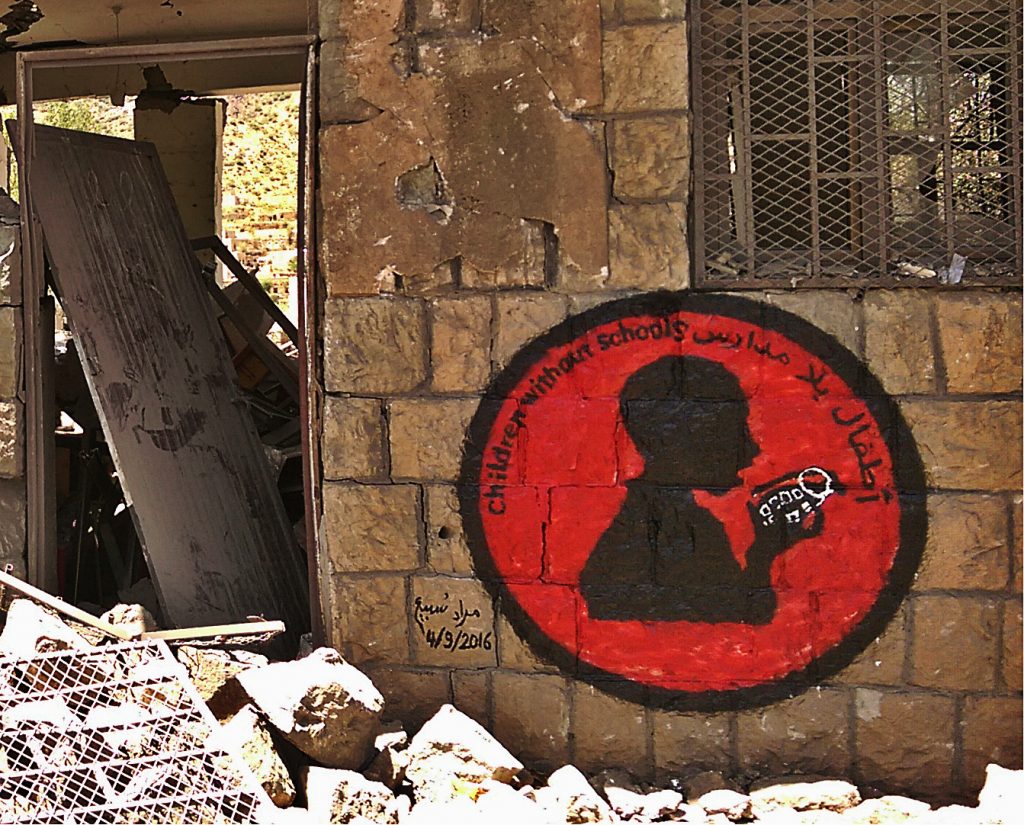
An anti-war mural created by Yemeni street artist Murad Subay, 2016 Freedom of Expression Arts Award winner.
Art has been used as a form of protest during times of crisis throughout history. It is a popular and, at times, effective platform to express opinions about societal or governmental problems, particularly when other forms of protest are not available. Protest art includes performances, site-specific installations, graffiti and street art.
Here Index highlights key articles about art and protest from around the world, from the past five decades.
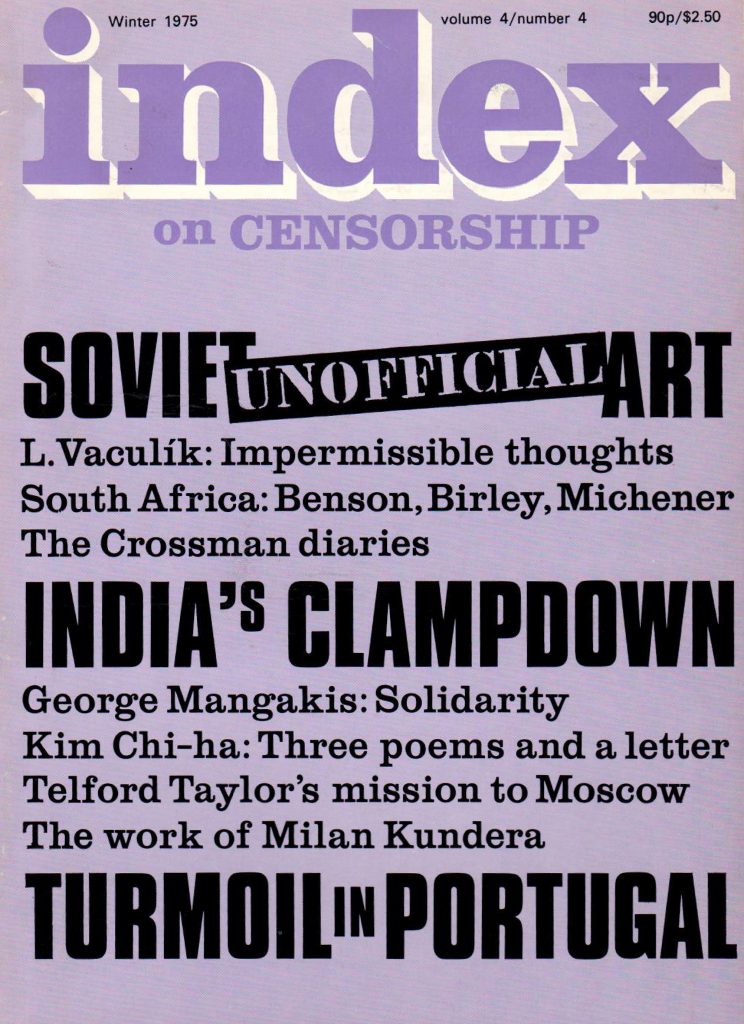
Soviet “unofficial” art
December 1975, vol. 4 issue: 4
Alexander Glezer writes about his participation in organising the unofficial art exhibit in Moscow. When the first exhibition opened, it was bulldozed by undercover police officers and agents from the KGB (Committee for State Security). In the second exhibition, the authorities were forced by the public to grant permission and ten to fifteen thousand people came to see the paintings and sculptures of 50 nonconformist artists’. Glezer, 41-years-old, was questioned by the KGB, arrested and sentenced 10 days for “hooliganism”. He was allowed to leave the Soviet Union in 1975 February.
Read the full article
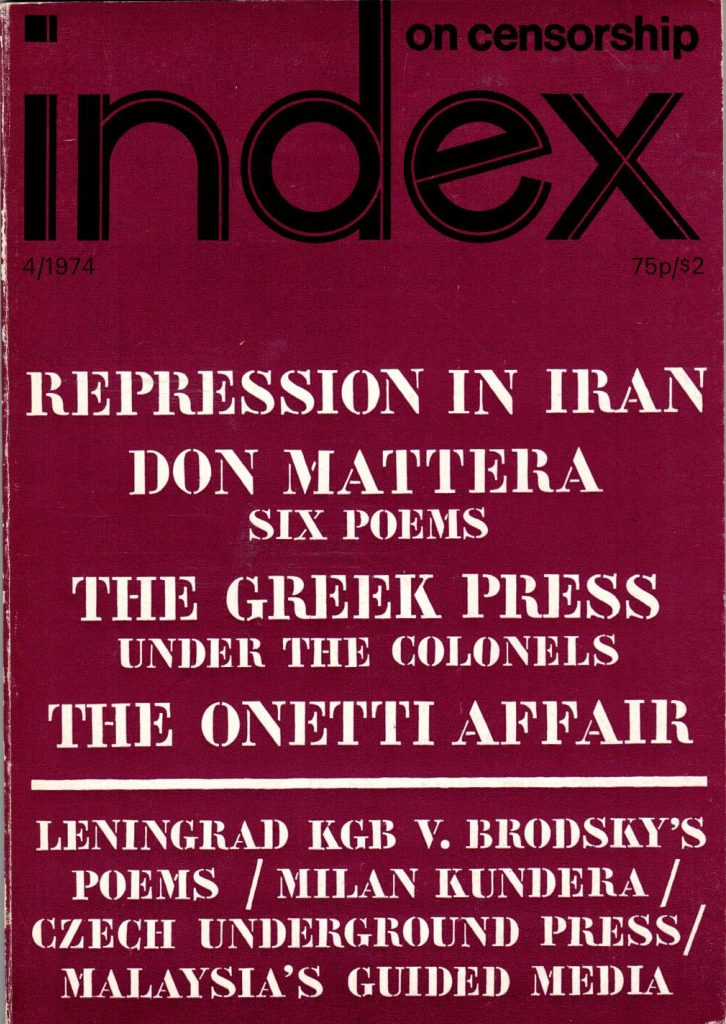
Portugal: Art triumphant
December 1974, vol. 3 issue: 4
The Sao Mamed Gallery opened with 186 artworks by 87 artists who had never shown their work in public before due to the regime’s dictating of Portuguese life. The gallery was built to celebrate the result of the military coup abolishing censorship of expression.
Published in the New York Times.
Read the full article
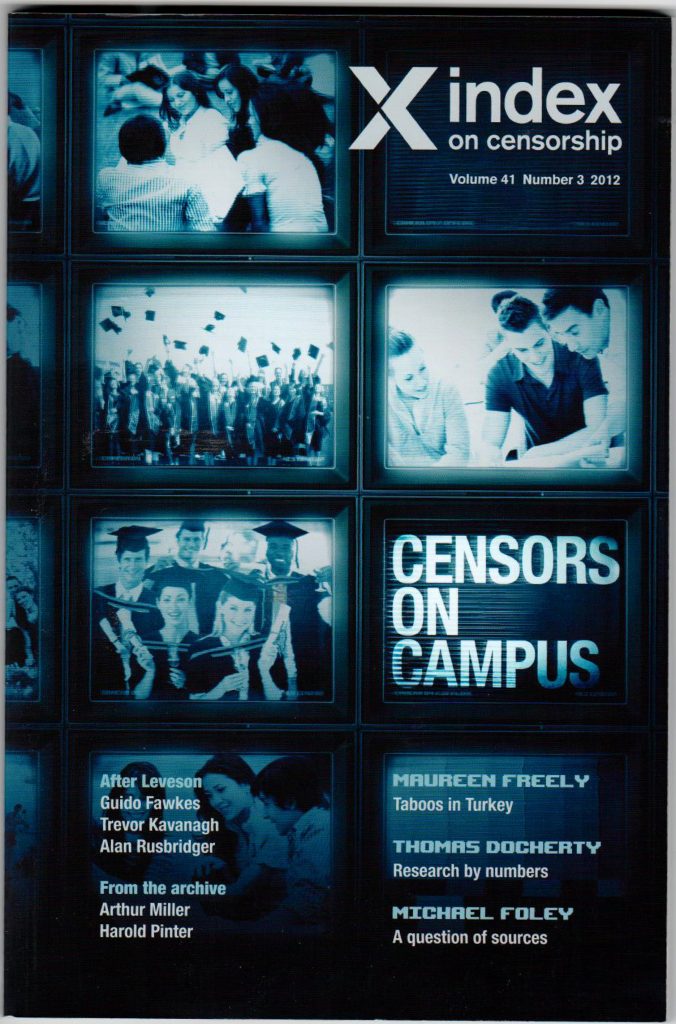
Art of Resistance
September 2012, vol. 41 issue: 3
Malu Halasa, co-curator of the exhibition Culture in Defiance: Continuing Traditions of Satire, Art and the Struggle for Freedom in Syria, writes about how the violence in Syria affected country’s art of resistance production and then created ideas of spreading this work further West which was the reason for the exhibition’s creation.
Read the full article
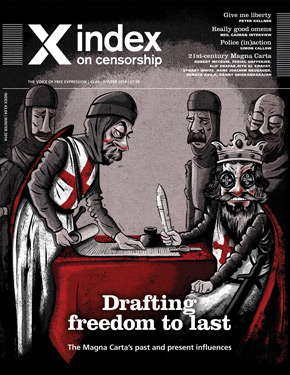
Dark Arts: Three Uzbek artists speak out on state constraints
December 2014, vol. 43 issue: 4
Author Nargis Tashpulatova interviews writer three Uzbek artists – Sid Yanishev, photographer Umida Akhmedova and conceptual artist Vyacheslav Akhunov who continue to create artwork throughout governmental threats and censorship and the regression of art in Uzbek society.
Read the full article
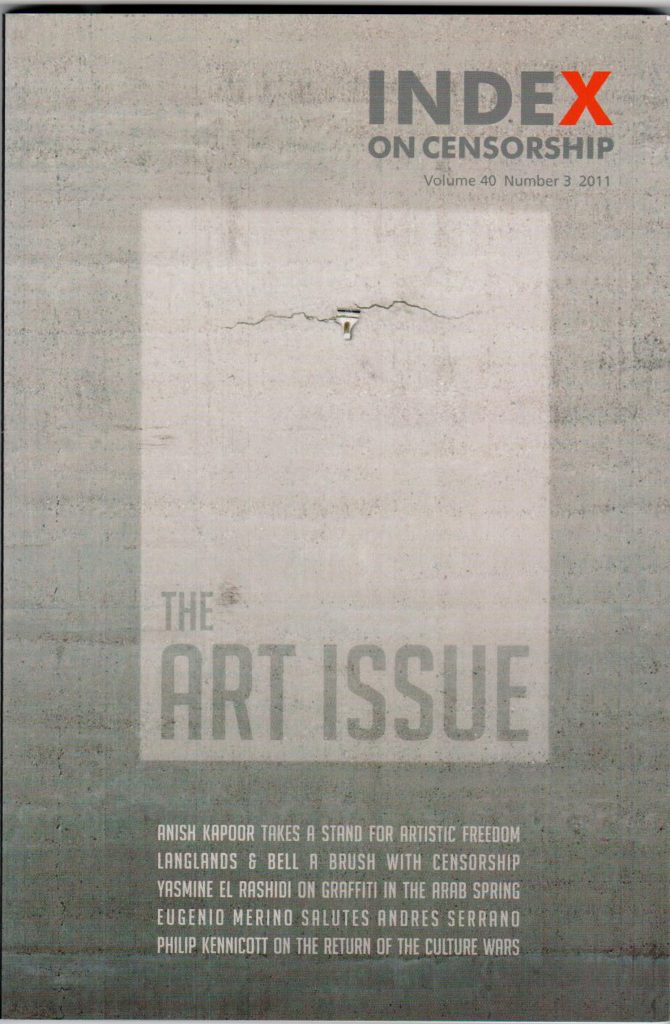
Art or Vandalism
October 2011, vol. 40 issue: 3
Yasmine El Rashidi writes on the outbreak of graffiti in the streets in Cairo during the 18 days of the Egyptian revolution.
Read the full article
[/vc_column_text][/vc_column][/vc_row][vc_row][vc_column][vc_basic_grid post_type=”post” max_items=”4″ element_width=”6″ grid_id=”vc_gid:1546513460633-7f241be5-ccf1-1″ taxonomies=”8890″][/vc_column][/vc_row]
02 Jan 19 | Global Journalist, Media Freedom, News and features, Russia
[vc_row][vc_column][vc_column_text]This article is part of Index on Censorship partner Global Journalist’s Project Exile series, which has published interviews with exiled journalists from around the world.[/vc_column_text][vc_single_image image=”104433″ img_size=”full” add_caption=”yes”][vc_column_text]A decade ago, Russian journalist Yulia Latynina thought dissidents who compared President Vladimir Putin’s rule to the Soviet times were ridiculous.
“Five to 10 years ago, I would never fear for my life and I would just laugh at people who would compare the situation with the Soviet” era, she says.
Latynina has long hosted a popular talk show on the independent broadcaster Radio Echo Moscow and is a columnist for Novaya Gazeta, a newspaper critical of Putin. Yet in 2008, she turned to Russia’s security service, the FSB, when she felt threatened for her critical views on Russia’s war with neighboring Georgia over the breakaway Caucasus regions of Abkhazia and South Ossetia. At that time, the state was still willing to protect a Russian journalist, even a critic.
However since Russia’s 2014 invasion of Ukraine, things have changed, says Latynina, in an interview with Global Journalist. Attacks against journalists, opposition politicians and activists have been outsourced to people close to the Kremlin, such as Putin associate Yevgeny Prigozhin, she adds. The state will no longer shields its critics.
“The red line is crossed,” she says, in an interview with Global Journalist. “Now it’s quite different. There’s obviously no way I’m going to be protected.”
Indeed, Latynina is no longer laughing about security threats. In 2016, as she was walking in central Moscow, a man in a motorcycle helmet threw a bucket of faeces on her. In July 2017, someone sprayed a noxious chemical all around the house she shared with her elderly parents, sickening two children who lived next door. In September 2017, her parked car was set on fire. To date, their have been no prosecutions in any of the incidents.
Given the frequency with which Putin’s opponents have turned up dead and Russia’s continuing pressure on independent journalists, the attacks were hard to ignore. Shortly after her car was torched, Latynina and her parents fled the country. They’re now living in a different European country, which Latynina won’t disclose out of fear for her safety.
Yet even from abroad, she continues to write for Novaya Gazeta and host the Radio Echo Moscow program “Access Code.” Latynina, who has also written more than 20 books, spoke with Global Journalist’s Shirley Tay about the Kremlin’s outsourcing of political violence and the climate for free expression in Russia. Below, an edited version of their interview.
Global Journalist: A number of journalists critical of Russia have been attacked in recent years. What do you think President Putin’s role is in this?
Latynina: Instead of exercising direct censorship, Mr. Putin is farming out violence to various groups around him. One of the most famous examples is of course the Kremlin “cook,” [Yevgeny] Prigozhin. Novaya Gazeta is writing a lot about him.
Mr. Prigozhin is suspected of organizing numerous attacks on journalists and activists. We have reasons to believe that Mr. Prigozhin very early on took an interest in Novaya Gazeta. He specifically inserted a spy in Novaya Gazeta [who] conducted several operations against its journalists.
GJ: How does this create problems for the Russian state?
Latynina: Obviously there are people behind whom Putin is hiding. So there’s always the idea of plausible deniability.
At the same time, when you’re losing control of violence, what does the modern state do? It has a monopoly over violence. Mr. Putin, he has lost that monopoly on purpose and only to people who are friendly to him. But when you lose the monopoly of violence, this also means you are losing any means to control it.
Despite the fact that I know lots of people behind the government think highly of me…obviously nobody’s going to say no to the people who would like to attack [me]. So that’s the biggest problem.
GJ: You’ve said things have gotten worse over the years. In what way?
Latynina: Russia was a very free country back in the 1990s. It was still not that bad in the beginning of the 21st century. Five to 10 years ago, I would never fear for my life and I would just laugh at people who would compare the situation with the Soviet [era].
I can mention a very funny story that happened to me back in 2008 after the Russia-Georgia war. I was one of the few [Russian] journalists, who from the beginning, was saying that this war is 100 percent an aggression from Russia against Georgia, and it was carried out in a very surreptitious way, just like later with the Ukraine.
I traveled to [the breakaway Georgian territory of] South Ossetia. As far as I surmise the [pro-Russia] South Ossetian authorities didn’t like what I wrote. People were following me. I was thinking they were probably some pro-Kremlin activists. I was so surprised and frightened to see that these are people from the Caucasus. I managed to take a photo of their car – it was without number plates.
I went to Alexei Venediktov, the head of our radio station. I showed him the photo. He talked to Alexander Bortnikov, who was the head of the FSB [Federal Security Service]. I think Mr. Bortnikov didn’t like the idea of Russian journalists being killed by [people] who were definitely not Russian and who were not authorized to carry out this killing.
They gave me protection for six months. And they caught the guys. It was hard because as I said there were no number plates. They never charged them with anything resembling an attack on me, and it turned out they were hardened criminals.
…[But] even eight years ago, despite the fact that the situation in Russia was already very bad and I was one of the most outspoken critics of the Russia-Georgian war, the FSB were definitely unhappy with the idea of somebody killing or at least maiming Yulia Latynina. They were probably thinking that if a Russian journalist is going to be killed, it should be done by the FSB and not by somebody from the outside. I wholeheartedly agree with them on this.
So this was just eight years ago when I could still apply for state protection. After [the 2014 war in] Ukraine, I think this was the limit. The red line is crossed. Now it’s quite different. There’s obviously no way I’m going to be protected.
GJ: Was there a particular article you wrote that sparked the most recent attacks?
Latynina: No, it was just a series of attacks. In the summer of 2016, they covered me in poo. It was actually done very expertly. This is why we immediately realized in Novaya Gazeta who is responsible, but I cannot openly state who is responsible, I have no proof.
The people who did this were following my car, and probably for some time, because I like to walk and my car was parked like two or three kilometers from the radio station.
After they did it, I started running after one of them. He crossed the street and jumped on [the back] of a motorcycle and drove off. The police, in the beginning, they started investigating. They found the motorcycle in question through [surveillance] cameras. They drove to a place where there are no cameras and a lot of warehouses and [the motorcycle] never came out. What came out instead was a small truck with stolen number plates. So obviously there was a very high degree of planning.
This didn’t actually frighten me because obviously if somebody wants to kill you, he doesn’t cover you in poo. So I continued to say what I’m saying.
GJ: What happened next?
Latynina: What happened the next summer [in 2017] when me and my parents are both living in our house, there’s another attack. This one is a very funny one because it’s done with a foul-smelling gas. I couldn’t believe that this is really something directed against us because it seems so funny. It later turned out that the gas, when we analyzed it, it was what you would call a non-lethal military grade substance–very rarely used and very hard to obtain.
When I realized it was done on purpose, I surmised it’s not dangerous because obviously if it’s dangerous it won’t smell so bad. After this my mother had lung problems – it’s a house that’s split in half, we have neighbors – so eight people were affected, two of them children, four of them seniors. This was a very unhappy experience. They put it in my car [too] and it was completely unusable after this because it smelled like a skunk and nothing could be done about it.
A month after this, the car was torched. I believe the only reason it was torched was because probably they were listening to our conversations in Novaya Gazeta and they realized that we were analyzing the substance and they didn’t want it to be analyzed.
The big problem was that I was on a lecture tour outside of Russia, so my parents were home. They torched the car and the problem is that we have a wooden house. My [79-year-old] father ran out, and the car is very close to the house. So he started putting the fire out, and it could have exploded, burning the house.
I guess this was the last straw. This was probably the idea, to drive me out of the country. These incidents came right after I spoke a lot about Mr. Prigozhin and how he got a license to extract oil in those parts of Syria liberated by his [private security company] Wagner.
GJ: You’ve continued your work for Novaya Gazeta and Radio Echo Moscow even while living abroad. Russia is thought to have killed people overseas in the past, including former spy Sergei Skripal in England. Do you think journalists should continue reporting if their life is in danger?
Latynina: First of all, I hope my life is not really in danger, I’m pretty sure a lot has to change in Russia before I become a target of a state-sponsored attack. Trying to kill Skripal and his daughter was a very dirty thing to do, but there’s a big difference between killing an agent who was spying for another country and trying to kill a journalist.
I think Russia has not yet crossed this threshold. Unfortunately, it seems that maybe some people who are private operators did cross the threshold.
I’m constantly waiting for the consequences. I’m not just a journalist, I’m a writer. I want to finish my books on Christianity and I want to finish a couple of novels. So if I really had to choose between my life and reporting, I’m not sure reporting would mean that much to me.
But I hate lies. I hate lies whenever I see them and I just can’t stand lies. So whenever I see a lie, I call it a lie. I cannot make a compromise. My ratings are high because people like what I say. If I start going soft and if I started going all squishy and I just put my head under my wing and slept, people just wouldn’t listen to me. So you have to choose. The only thing that’s changed is that I’m living a much safer and much more relaxed life.
[/vc_column_text][vc_video link=”https://youtu.be/_t8aotBf7q8″][/vc_column][/vc_row][vc_row][vc_column width=”1/2″][vc_video link=”https://youtu.be/6BIZ7b0m-08″][/vc_column][vc_column width=”1/2″][vc_column_text]Index on Censorship partner Global Journalist is a website that features global press freedom and international news stories as well as a weekly radio program that airs on KBIA, mid-Missouri’s NPR affiliate, and partner stations in six other states. The website and radio show are produced jointly by professional staff and student journalists at the University of Missouri’s School of Journalism, the oldest school of journalism in the United States. [/vc_column_text][/vc_column][/vc_row][vc_row][vc_column][vc_custom_heading text=”Don’t lose your voice. Stay informed.” use_theme_fonts=”yes”][vc_separator color=”black”][vc_row_inner][vc_column_inner width=”1/2″][vc_column_text]Index on Censorship is a nonprofit that campaigns for and defends free expression worldwide. We publish work by censored writers and artists, promote debate, and monitor threats to free speech. We believe that everyone should be free to express themselves without fear of harm or persecution – no matter what their views.
Join our mailing list (or follow us on Twitter or Facebook). We’ll send you our weekly newsletter, our monthly events update and periodic updates about our activities defending free speech. We won’t share, sell or transfer your personal information to anyone outside Index.[/vc_column_text][/vc_column_inner][vc_column_inner width=”1/2″][gravityform id=”20″ title=”false” description=”false” ajax=”false”][/vc_column_inner][/vc_row_inner][/vc_column][/vc_row][vc_row full_width=”stretch_row_content”][vc_column][three_column_post title=”Global Journalist / Project Exile” full_width_heading=”true” category_id=”22142″][/vc_column][/vc_row]
31 Dec 18 | Bahrain, Bahrain Statements, Campaigns -- Featured, Statements
[vc_row][vc_column][vc_single_image image=”77714″ img_size=”full” add_caption=”yes”][vc_column_text]
Bahrain’s Court of Cassation has upheld human rights activist Nabeel Rajab’s five-year conviction for critical tweets made from his account condemning Saudi-led airstrikes in Yemen and the use of torture at Bahrain’s notorious Jau Prison.
Rajab, the president of the Bahrain Center for Human Rights and a 2012 Index on Censorship Freedom of Expression Award winner, has been sentenced in all to seven years in prison across two separate trials. In February 2018 he was given five years for the tweets in addition to a two-year conviction in June 2017 for “broadcasting fake news” relating to television interviews he gave in 2015, a conviction that remains upheld.
“Nabeel Rajab has suffered relentless harassment and intimidation for expressing opinions,” Jodie Ginsberg, CEO of Index on Censorship, said. “Index reiterates: opinions are not crimes. Bahrain must immediately release Nabeel and we call on Bahrain’s allies — including the UK — to advocate for this in the strongest possible terms.”
Rajab, known for his peaceful involvement in the Bahrain uprising of 2011, had unsuccessfully appealed the tweet convictions on four previous occasions and this was his fifth and final appeal. He has been in prison on a continual basis since June 2016, during which time his health has deteriorated significantly.[/vc_column_text][vc_basic_grid post_type=”post” max_items=”4″ element_width=”6″ grid_id=”vc_gid:1546244962795-53b7fef4-60df-3″ taxonomies=”3368″][/vc_column][/vc_row]
31 Dec 18 | Bahrain, Bahrain News, Campaigns -- Featured
[vc_row][vc_column][vc_single_image image=”103748″ img_size=”full” add_caption=”yes”][vc_column_text]
An Egyptian court on Sunday upheld a two-year prison sentence against activist Amal Fathy, who had been detained since May after posting a Facebook video that criticised sexual harassment in Egypt.
Her lawyer Ramadan Mohamed told Middle East Eye that her appeal had been rejected and that she would now serve jail time. Fathy is also accused of publishing offensive content, Mohamed said.
Jodie Ginsberg, CEO of Index on Censorship, said: “Index on Censorship is extremely disappointed at the decision to uphold the sentence against Amal. She should never have been charged or detained for expressing her opinion. All charges against her should be dropped and she should be released.”
Fathy and her husband Mohamed Lotfy, together with their young son, were detained after a night-time raid on their apartment on 11 May. Lotfy and the couple’s son were released after several hours, but Fathy has remained detained since then.
Following the Facebook video Ms Fathy was sentenced in September for “spreading fake news”. She also faced security-related charges, including for membership of a terrorist organisation.
Lotfy is co-founder and executive director of the Egyptian Commission for Rights and Freedoms, which received an Index on Censorship Freedom of Expression Campaigning Award in April 2018.
In May leading international human rights lawyers at Doughty Street Chambers, jointly with ECRF and Index on Censorship, lodged complaints with the United Nations rapporteurs on freedom of expression and human rights defenders regarding Fathy’s detention. In July, Doughty Street Chambers, ECRF and Index raised Fathy’s case with the United Nations Working Group on Arbitrary Detention.[/vc_column_text][vc_basic_grid post_type=”post” max_items=”4″ element_width=”6″ grid_id=”vc_gid:1546240564789-ca455c3f-0710-0″ taxonomies=”25926″][/vc_column][/vc_row]
21 Dec 18 | Croatia, Hungary, Macedonia, Media Freedom, media freedom featured, Montenegro, News and features, Poland, Serbia
[vc_row][vc_column][vc_single_image image=”104453″ img_size=”full” add_caption=”yes”][vc_column_text]Additional reporting by Ada Borowicz, Ilcho Cvetanoski, Lazara Marinković and Zoltán Sipos
Unpatriotic behaviour. Sedition. Being in the pay of shadowy external forces. Faking a neo-Nazi event. These are just a few of the charges that have recently been levelled against independent journalists by pro-government media outlets in several central and eastern European countries.
The opening volley in a sustained campaign of vilification directed at Serbia‘s independent media was fired by the state-owned weekly Ilustrovana Politika at the end of October, with an article that accused journalists who are critical of the government of being “traitors and collaborators with the enemies of Serbia”.
Two weeks later, Ilustrovana Politika followed up with another piece that accused the veteran journalist Ljiljana Smajlović – who has long been critical of the nationalistic legacy bequeathed on the country by its former leader Slobodan Milosević and co-founded the Commission Investigating the Murders of Journalists in Serbia – of complicity in the 1999 NATO bombing of Belgrade.
In mid-December, Ilustrovana Politika’s campaign of character assassination against Smajlović ratcheted up another level with a garish front page depicting her as a Madonna figure with two naked infants bearing the features of Veran Matić, the chairman of the commission, and US Ambassador to Serbia Kyle Scott.
Smajlović has no doubt over what lies behind this tidal wave of denigration, of which she has become the prime target.
History repeating itself?
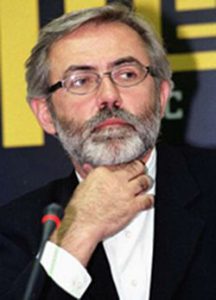
Editor Slavko Ćuruvija was murdered in 1999.
The long-running trial of four ex-members of the Serbian intelligence service accused of the murder of Dnevni Telegraf editor Slavko Ćuruvija – shot dead in April 1999 a few days after the pro-government Politika Ekspres accused him of welcoming the NATO bombardment – is now in its final stages, and Smajlović is convinced that the current campaign against her is designed to influence the judges in the case.
“The attacks come from the same Milosevic-era editors who also targeted my colleague Ćuruvija as a traitor prior to his assassination,” she told Mapping Media Freedom. “What is also sinister is that they are published and printed by the same state-owned media company that targeted Slavko nearly twenty years ago.”
“The clear implication is that I am the same kind of traitor as he was. How will that affect the judges? Will they fear this is not a good time to hold state security chiefs to account?” she added.
While Smajlović admits that Ilustrovana Politika’s denunciation has made her feel insecure, she insists she is less concerned for her own safety than worried about the consequences for the outcome of the Ćuruvija trial. Quoting Marx’s dictum that “History repeats itself, first as tragedy and then as farce”, Smajlović said. “I hope this is the farce part.”
Laying the blame
In Serbia and other central and eastern European countries, the assignment of responsibility for historic causes of resentment and the potential of these to further divide a polarised public often form the background to attacks on independent journalists by their state-approved colleagues.
The thorny topic of Poland’s relations with Germany during the last century recently gave pro-government media in Poland a chance to accuse independent media of being insufficiently patriotic and even of falsifying facts.
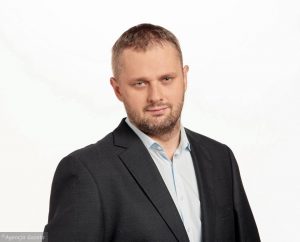
Journalist Bartosz Wieliński was targeted by the head of TVP Info’s news site.
In November, after Bartosz Wieliński, a journalist with the independent daily Gazeta Wyborcza, gave a critical account of a speech made by the Polish ambassador to Berlin at a conference devoted to the centenary of Poland’s independence, the head of the state broadcaster’s news website, TVP Info, accused him of lying and of putting the interests of Germany before those of his own country.
Only a few days before this attack, two media outlets that support Poland’s ruling national-conservative Law and Justice (PiS) party accused the independent US-owned channel TVN of fabricating the evidence on which a report about the resurgence of neo-Nazism in Poland was based.
Since it came to power in 2015, PiS – which has been accused by its critics of tolerating organisations that espouse far-right ideologies – has put pressure on independent media outlets, many of which are foreign-owned, as part of its campaign to “re-polonise” the media, and now appears to be using the public broadcaster and other tame outlets as accessories in this drive.
Willing accomplices
In Hungary, where the government led by Viktor Orbán has succeeded in imposing tight control on all but a few determinedly independent media outlets, a number of loyal publications are available for the purposes of vilification.
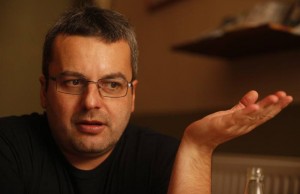
2015 Freedom of Expression Journalism Award winner Tamás Bodoky, founder of Atlatszo.hu
In September, a whole raft of pro-government media outlets vied with each other to depict Tamás Bodoky, the editor-in-chief of the investigative journalism platform Átlátszó and winner of the 2015 Index on Censorship Freedom of Expression Award for Journalism, as a “Soros hireling”. Bodoky became the target of a co-ordinated smear campaign after he posted on Facebook a picture of himself taken in Brussels with Dutch Green MEP Judith Sargentini, whose report on the Fidesz government’s infringement of core EU values had formed the basis for the European parliament’s censure motion against Hungary a few weeks earlier.
Another Hungarian journalist, András Dezső, who works for the independent news website Index.hu, also recently came under attack from pro-government media outlets after a Budapest court let him off with a reprimand over a case in which he was alleged to have made unauthorised use of personal information. In an article published before April’s general election, Dezső had cast doubt on the account of a woman who declared on Hungarian TV that she felt safer in Budapest than in Stockholm because of the lower level of immigration in Hungary. The airing of the interview by the public broadcaster was seen as providing support for Fidesz’s anti-immigration stance and aiding its election victory.
A criminal charge was issued against Dezső for “misuse of personal data”, and after he received what was described in the Hungarian media as “the mildest possible punishment”, two pro-government news websites, 888.hu and Origo.hu, accused him of deliberately propagating fake news and seeking to mislead his readers.
Why do they do it?
What motivates those journalists who smear their colleagues who seek to hold power to account?
There does not appear to be a simple answer to this question. While some may vilify fellow journalists to order purely for financial gain (or because of a desire for job security, government-sponsored media outlets generally being on a more secure financial footing than their independent counterparts), some appear to approach the task with at least a measure of conviction.
Ilcho Cvetanoski, who reports on Bosnia, Croatia, Macedonia and Montenegro for Mapping Media Freedom and has observed many smear campaigns over the years, believes that financial and ideological motivating factors are often inextricably intertwined. He points out that two decades on from the armed conflicts in the region, Balkans societies are still deeply divided along ideological and ethnic lines, and many people still find it extremely difficult to accept the right of others to see things differently. Cvetanoski notes that there are many “true believers” who are genuinely convinced that they have a duty to defend their country from the “other” – a group in which they tend to lump critical journalists along with mercenaries, spies and traitors.
Lazara Marinković, who covers Serbia for Mapping Media Freedom, believes that the main motivation there is a need to be on the winning side and to please those in power. “Often they actually enjoy doing it, either for ideological reasons or because they feel more powerful when they are on the side of the ruling party,” she told Mapping Media Freedom. Marinković noted that the majority of Serbian tabloids and TV stations that conduct smear campaigns against independent journalists are owned by businessmen who have close links to President Aleksandar Vučić’s national conservative Serbian Progressive Party (SNS). Vučić began his political career during the Milosević era, when he served as Minister of Information.
In Poland, the divisions in society and the consequent lack of tolerance in political culture have been blamed for the increasing polarisation of the media. Michal Głowacki, a professor of media studies at Warsaw University, told Mapping Media Freedom that journalists take their cue from politicians in failing to show respect for fellow journalists associated with the “other side”. “They even use the same language as politicians,” Głowacki notes.
This is a view echoed by Hungarian journalist Anita Kőműves, a colleague of Bodoky’s at Átlátszó. Kőműves, however, insists that while journalists who work for independent media outlets strive to uphold the principles of journalistic ethics, the same cannot be said of those employed by pro-government outlets. “Some of those serving the government at propaganda outlets think that the two ‘sides’ of the Hungarian media are equally biased and that they are not acting any differently from their counterparts in the independent media sphere. However, this is not true: pro-government propaganda outlets do not adhere to even the basic rules of journalism,” she told Mapping Media Freedom.[/vc_column_text][vc_raw_html]JTNDaWZyYW1lJTIwd2lkdGglM0QlMjI3MDAlMjIlMjBoZWlnaHQlM0QlMjI0MDAlMjIlMjBzcmMlM0QlMjJodHRwcyUzQSUyRiUyRm1hcHBpbmdtZWRpYWZyZWVkb20udXNoYWhpZGkuaW8lMkZ2aWV3cyUyRm1hcCUyMiUyMGZyYW1lYm9yZGVyJTNEJTIyMCUyMiUyMGFsbG93ZnVsbHNjcmVlbiUzRSUzQyUyRmlmcmFtZSUzRQ==[/vc_raw_html][vc_basic_grid post_type=”post” max_items=”4″ element_width=”6″ grid_id=”vc_gid:1545385969139-cb42990e-b3e2-3″ taxonomies=”9044″][/vc_column][/vc_row]
20 Dec 18 | Campaigns -- Featured, Press Releases

Amal Fathy with her husband Mohamed Lotfy
Index on Censorship and leading international human rights lawyers at Doughty Street Chambers welcome the news that Amal Fathy, detained for speaking out against sexual harassment in Egypt, is finally to be freed on probation.
Fathy was arrested in May 2018 after posting a Facebook video that expressed anger at the sexual harassment suffered by women in Egypt. Her husband Mohamed Lotfy and their young son were also held after a night-time raid on their apartment but were released after several hours. Fathy was charged with membership of a terrorist organisation and other related charges and has remained detained since then. A Cairo criminal court has now ordered her release.
Lotfy is co-founder and executive director of the Egyptian Commission for Rights and Freedoms (ECRF), which has played a key role in increasing awareness of enforced disappearances, censorship, torture and violations of freedom of expression and association in Egypt. This has led to frequent incidents of harassment, arrest and detention of staff. ECRF received an Index on Censorship Freedom of Expression Campaigning Award in April 2018.
In May, Doughty Street lawyers, jointly with ECRF and Index on Censorship, lodged complaints with the United Nations rapporteurs on freedom of expression and human rights defenders regarding Fathy’s detention. In July, Doughty Street Chambers, ECRF and Index raised Fathy’s case with the United Nations Working Group on Arbitrary Detention.
Mohamed Lotfy of ECRF said: “Amal should be released immediately and her probation lifted so that she can enjoy the full freedom she deserves. An acquittal on 30 December is long overdue.”
Jodie Ginsberg, CEO of Index on Censorship said: “Index on Censorship welcomes the news that Amal Fathy is to be freed. She should be released immediately to be reunited with her husband and son. Ms Fathy’s only ‘crime’ was to criticise the sexual harassment suffered by women in Egypt and the government’s failure to deal with it.”
Caoilfhionn Gallagher QC, Doughty Street Chambers said: “Amal Fathy has been detained arbitrarily for seven months, in unsanitary conditions, without meaningful access to her lawyers, and away from her family and young son. We welcome the court order to release her. We now call on the Egyptian authorities to comply with that order immediately and drop all outstanding charges against her. Amal Fathy should be free, and free to speak her mind – not behind bars, not on probation, and not stopped from speaking out on vitally important issues to Egyptian society, civil liberties and women’s rights.”
Amal Fathy will next appear in court on 26 December, with another court date currently set for 30 December on the related charges of “broadcasting a video harming national security”, “posting a video inciting to overthrow the regime and spreading false rumours”, and “misusing social media”.
20 Dec 18 | Africa, Awards, Fellowship, Fellowship 2018, News and features, Sub-Saharan Africa
[vc_row][vc_column][vc_column_text]
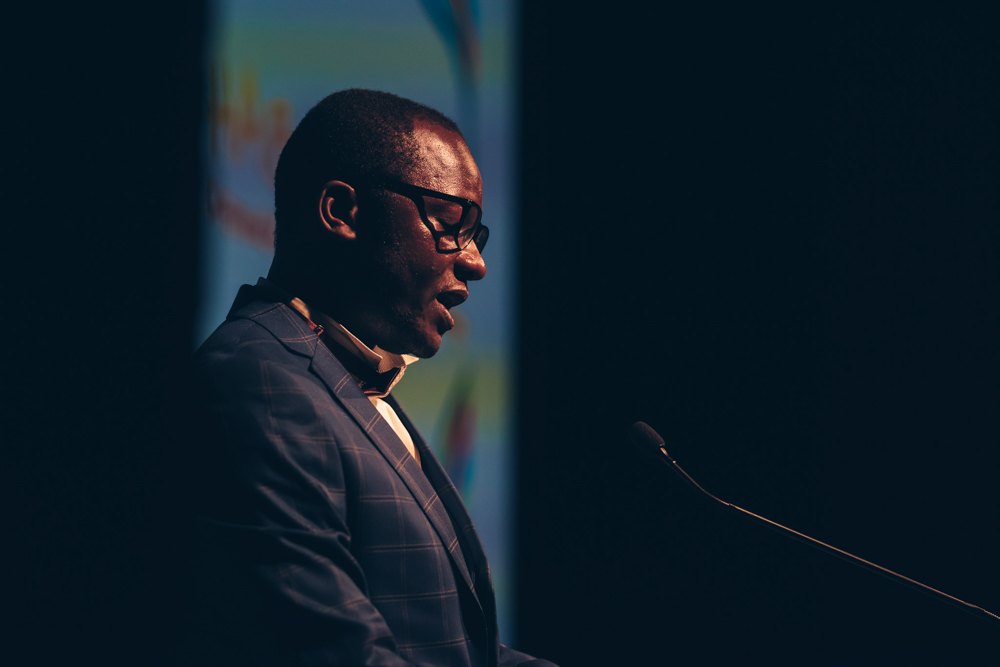
Guy Muyembe of the Digital Activism Award-winning Habari RDC at the 2018 Index on Censorship Freedom of Expression Awards (Photo: Elina Kansikas for Index on Censorship)
The Democratic Republic of Congo will go to the polls on 23 December to elect a successor to incumbent president Joseph Kabila, who has been in power since January 2001 when he inherited the position from his assassinated father. The election was originally scheduled for 27 November 2016, a delay that has caused many problems for the country.
“The only thing that is certain about the election is the uncertainty that comes with it,” Guy Muyembe, president of Habari RDC, the Index on Censorship Freedom of Expression Award Fellow for Digital Activism, tells Index. “Will it take place, will it not take place? How transparent will it be? In all likelihood, not very. And will the result tear the country apart?”
Launched in 2016, Habari RDC is a collective of more than 100 young Congolese bloggers and web activists who give voice to the opinions of young people from all over the Democratic Republic of Congo. In recent months, they have been working towards covering what could be the first democratic transfer of power in the country’s history.
“But in the end, it will most likely be the same people in power,” Muyembe says. “As for Kabila himself, if he remains in the country, he might be operating from the shadows. This is definitely not a reassuring prospect.”
This is a tense time for the DRC. The UN high commissioner for human rights Michelle Bachelet has expressed concern at violence against opposition rallies around the country in the run-up to the election. Bachelet called on the authorities to ensure “the rights to freedom of expression and peaceful assembly – essential conditions for credible elections – are fully protected”. Muyembe is also concerned about what all this means for those running in opposition to the ruling People’s Party for Reconstruction and Democracy: “They’re taking part in the campaign, but will they actually take part in the election in the end?”
During this period the risk factor for activists has been very high, Muyembe says. “They’re not protected legally, and it’s very easy to label them spies or start a crackdown against them.” The prospects for a free press in the country don’t look any better. Peter Tiani, a journalist for Le Vrai Journal, was arrested in November and faces a one-year jail term on defamation charges for reporting that a large sum of money was stolen from the home of Bruno Tshibala, the country’s prime minister. Tiani became a target because he reported on the second most powerful man in the DRC, Muyembe says.
“Even journalists who don’t explicitly view the government in a favourable way — those who aren’t necessarily negative but are neutral, as many are — are presented unfavourably by state media,” Muyembe explains. For those who are explicitly critical, he says, the situation can get even worse. With this in mind, Habari has put together some helpful advice for bloggers and citizen journalists.
Online freedoms too remain under strain in the absence of clear laws on the internet, Muyembe says. “While we do want to see such a law, we are also nervous because it could go in a very bad direction and is open to abuse.” As Habari has reported, the hacking of websites ahead of the election has facilitated both censorship and fake news.
Young Congolese people were at the forefront of calls for Kabila not to seek re-election, and Muyembe and his colleagues are keen to ensure that the voices of the country’s youth continue to be heard. Habari took part in Speak, a worldwide campaign organised by the NGO Civicus, in November, which sought to raise awareness and build global solidarity in an era when people around the world are facing increased attacks on their basic freedoms. Habari hosted the Gala of Peace, a meeting between young supporters of different political parties and members of citizen movements, that included theatre and dance as well as discussion.
“This year, the idea was to try to work on uniting people who’ve been divided, whether it’s on the social level or the political level,” Muyembe says. “This has much relevance in the DRC, for the divisions that exist between those people who are pro and anti-regime, between the old and young, between men and women and those of different tribes.”
The DRC is also right now in the middle of one of the worst Ebola outbreaks in its history, exacerbated by the ongoing unrest, making it impossible to transport adequate medical care to those in need. “This crisis is different this time around because it’s happening in a part of the country which has been severely affected by the war — the Kivu province in the east of the country,” Muyembe says. “Because of the war, there is a mass migration of the population there whenever there is an attack, which could turn into a major Ebola crisis as there’s a lot of people moving around.”
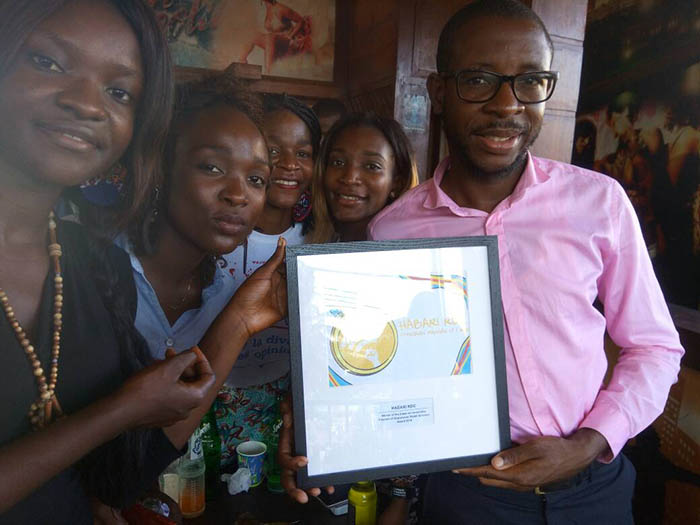
Next year will be a busy one for Habari in continuing to cover all of these issues. Going forward, the organisation’s biggest challenge, Muyembe says, is ensuring the project has a future as Habari’s partnership with RNW Media, a Dutch organisation that helps young people make social change, along with the essential funding from this relationship, ends in 2020.
However, becoming an Index on Censorship Fellow offers much hope, Muyembe says. “The award has increased how well-known the project is, and how serious it appears. If we now go to meet someone in Kinshasa to talk about the project, or go to an embassy to try to organise something, we are better received.”
For Habari, the training provided by Index, such as the virtual sessions on reporting on elections, has also been invaluable, Muyembe adds. The next training session, by Protection International in January, will focus on developing security and protection management strategies.
Muyembe says that people are often suspicious of organisations involving young people, but the Index award has made things a little easier in this regard. “Every day, colleagues have been telling me that they need to have a copy of the prize that they receive on their website,” he says. “It’s like a business card.”
[/vc_column_text][/vc_column][/vc_row][vc_row][vc_column][vc_basic_grid post_type=”post” max_items=”4″ element_width=”6″ grid_id=”vc_gid:1545229521275-5925950b-9a87-2″ taxonomies=”16143″][/vc_column][/vc_row]
19 Dec 18 | Americas, Awards, Fellowship, Fellowship 2018, Honduras, News and features
[vc_row][vc_column][vc_column_text]
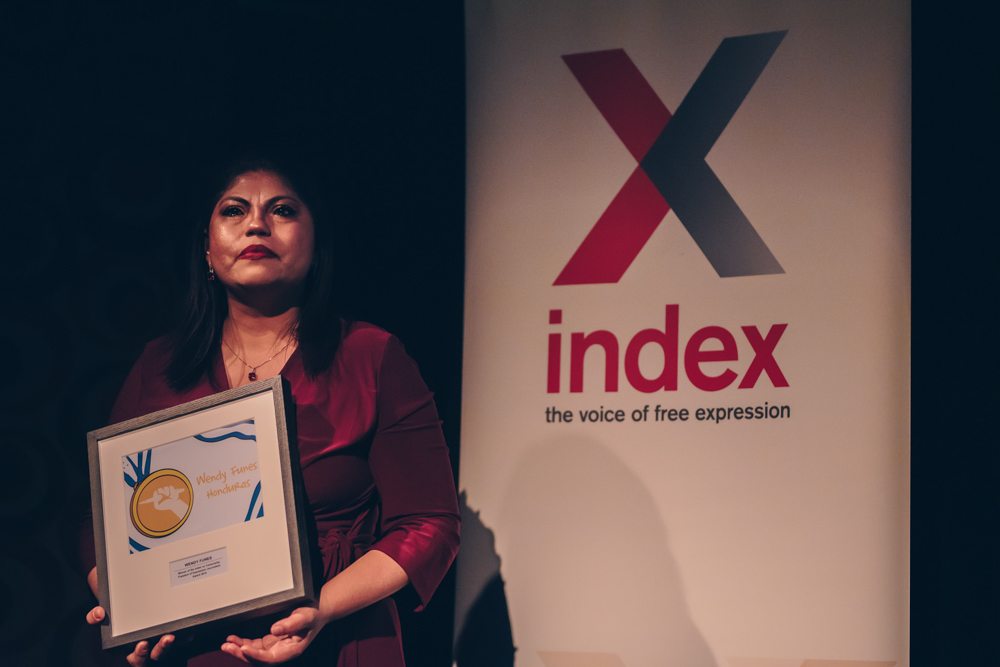
2018 Freedom of Expression Journalism Award-winner and 2018 Journalism Fellow Honduran investigative journalist Wendy Funes at the 2018 Index on Censorship Freedom of Expression Awards (Photo: Elina Kansikas)
“Violence is a way of keeping society under control because a lot of what people do or don’t do is a reaction to fear,” Wendy Funes, winner of the 2018 Index on Censorship Freedom of Expression Awards Fellowship for Journalism, tells Index on Censorship. “It becomes an indirect method of control, not just over society, but journalism as well.”
Funes worries this kind of violence has become “normalised” in Honduras and says the shooting and wounding of journalist Geovanny Sierra — who has survived numerous attempts on his life — by military police while covering protests of electoral fraud in late November is just the latest example. The Honduran authorities issued a statement saying that law enforcement was attacked first, which is why they started shooting. “With this they have justified the crime,” Funes says, adding that nothing is being done about the attacks on journalists in the country: “The most terrible thing is the impunity that exists because if something like this happened in another country it would a scandal, but here it is already forgotten.”
Funes is no stranger to covering either corruption or protest and has had her own brushes with heavy-handed state forces, although she says for the most part she has been lucky. “I’ve had training opportunities in self-protection and security,” she says. “I am also very cautious — I try to plan my routes and if I go inter dangerous areas, I try to have a safety protocol, to have alliances with civil society groups, so if something happens to me I can let them know.”
Recently, Funes’ investigative website Reporteros de Investigacion has been focusing on issues such as human trafficking, violence against student protesters, femicide and the high-level cocaine trafficking case involving Juan Antonio Hernández, brother of Honduran president Juan Orlando Hernández. The website has also been covering the caravan of people fleeing persecution, poverty and violence in the country. “They are facing a very cruel situation,” Funes says.
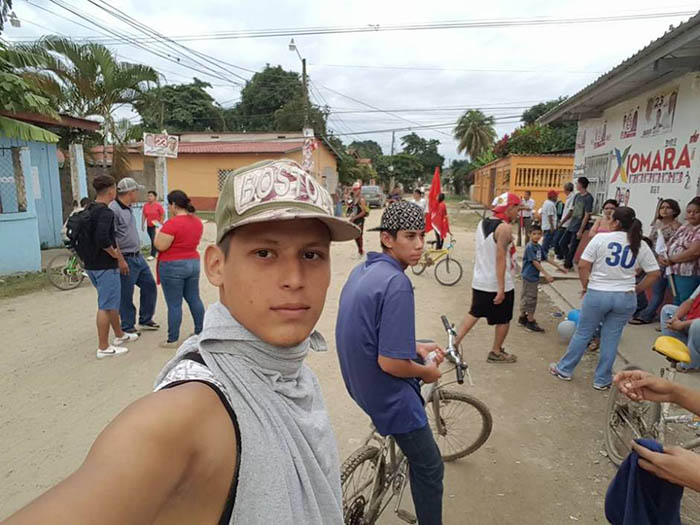
Honduran migrant Daniel Portillo
Although Reporteros de Investigacion doesn’t have the resources to cross the border, it has been working closely with some of those who have fled, such as 25-year-old Daniel Portillo, who left Honduras in search of the “American dream”. Portillo is now in Mexico. “He has found someone who works with migrants and helps migrants,” Funes, who first met him when she was covering protests in San Pedro Sula, a city in the northwest of Honduras, said. “He is a young person with a lot of leadership qualities, a lot of desire to advocate for other young people.”
While in Honduras Portillo organised sports tournaments in an area controlled by the criminal gang MS-13. “He resisted joining the gang,” Funes says. “He was always trying to negotiate with them so that he could help other young people so they wouldn’t get into drugs or alcohol.”
Writing in Reporteros de Investigacion, Portillo explains the difficulty of explaining to his young daughter that he left so she could have a better future: “If God allows it, we will see each other again or else, I am writing this letter to you in case unfortunately they killed me on the way and buried me; my heart is that of a warrior and I will continue forward, whatever happens, my mother suffers for my departure.”
“He told me that he has seen many people carved up since he was a child,” Funes tells Index. “Violence weighed on his psyche and made him very vulnerable young person. He told me that he looked for employment in Honduras, and when he could not find he decided to migrate with the caravan.”
It is such vulnerability that makes poor Hondurans so susceptible to human trafficking. “It’s like Russian roulette,” Funes says. “I have come to realise that there are many Hondurans who have an eagerness to migrate to the USA, but have ended up staying in countries like El Salvador, Guatemala, Mexico and Belize and have become victims of sexual exploitation, domestic service and forced matrimonies as they flee from gangs and narco-politics. Some of the people who have left come back mutilated because they lose limbs on the trains.”
For those that do make it to the USA, they face discrimination, but at least they have the opportunity for better salaries, with which they can send money to their families struggling back home, Funes says. These remittances play a key role in sustaining the Honduran economy. In May 2018 Hondurans abroad sent back an all-time high of $456.2 million in a single month.
While Funes would like to see more Hondurans stay at home, not only to avoid the very real risks that come with being a migrant, but also to fight for real change, she is all too aware of why people choose instead to leave. “You have to work five times harder than a corrupt individual to be able to sustain yourself and get ahead in Honduras. This economic model displaces the most vulnerable individuals.”
Much of what Funes and her team do over the next year will be geared towards her dream of founding a centre of investigative journalism, including training journalists and students with the help of Factum magazine in El Salvador. “This will bring together many different journalists who want to transform Honduras with investigative journalism,” Funes says.
With a grant from the National Endowment for Democracy, Funes and her team will also work on a project called Sembrando el Periodismo de Investigación en Honduras (Sowing Investigative Journalism In Honduras), which will involve four major investigations over the course of 2019.
“Many of the things that I dreamt of happening one day, in an idealistic way, have become reality, all thanks to Index,” Funes adds. “Solidarity, love and friendship are really the things that can move this world, and that is what Index is made of with all of the support they have extended to me.”
[/vc_column_text][/vc_column][/vc_row][vc_row][vc_column][vc_basic_grid post_type=”post” max_items=”4″ element_width=”6″ grid_id=”vc_gid:1561460137741-61f82764-3b8a-4″ taxonomies=”23255″][/vc_column][/vc_row]



















